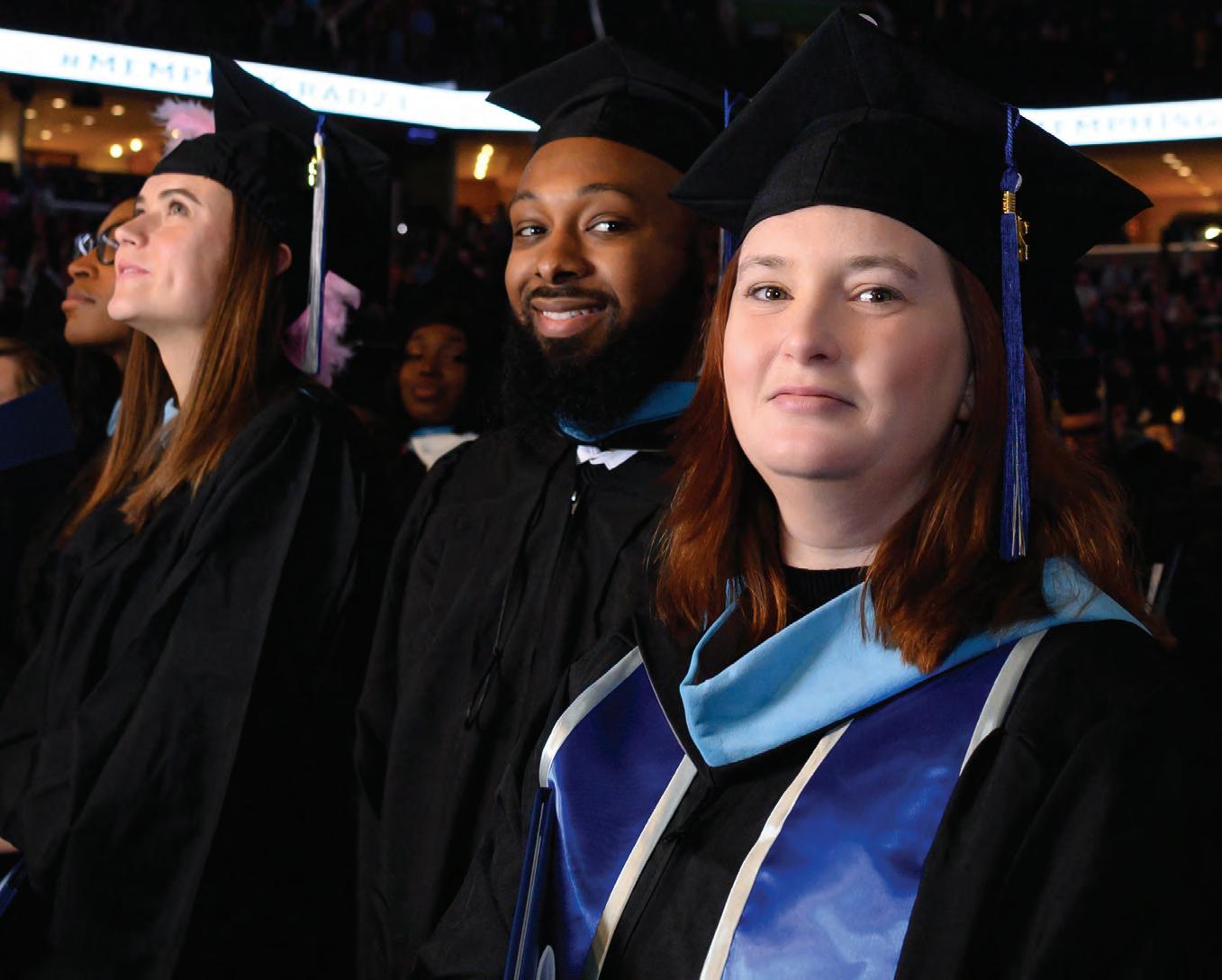




6
Read the latest news from the UofM, including the largest donation in University history and a grant to fund cutting-edge artificial intelligence research.
The UofM Lambuth campus in Jackson will soon be home to one of the University’s largest graduate programs when the newly approved Doctor of Physical Therapy.
12
The Fogelman College of Business & Economics is working toward a major renovation to transform its buildings into a stateof-the-art academic and research center.
16
The Bruns Scholarship Challenge raised a total of $3 million and created 36 new scholarships in three years.
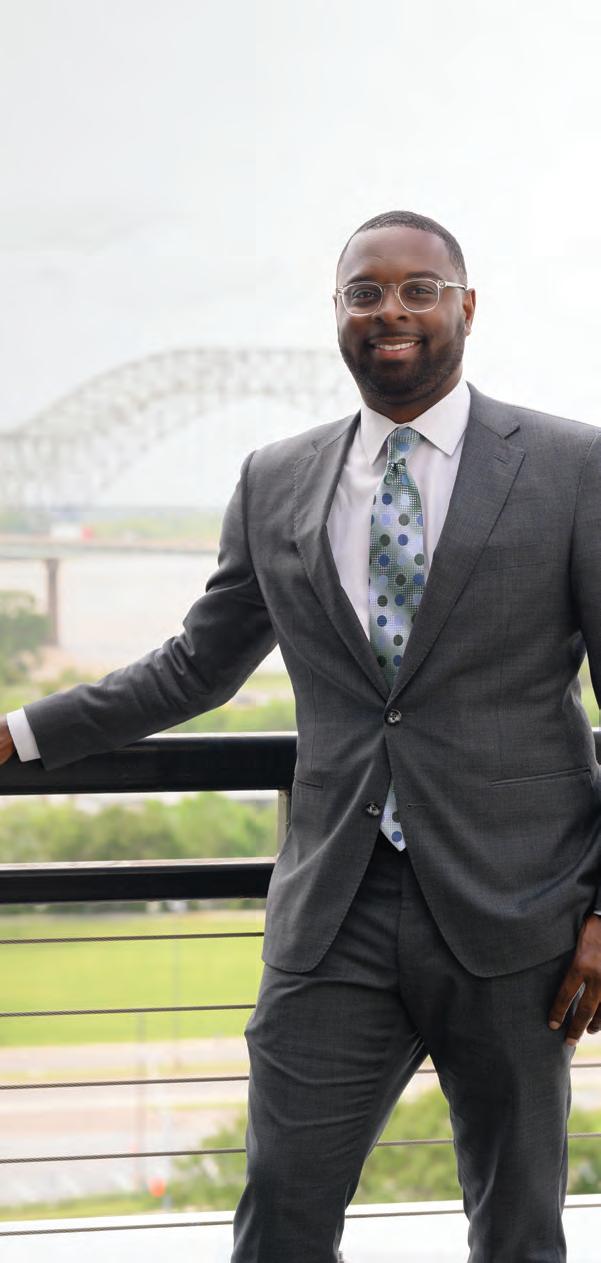
This edition spotlights a group of accomplished leaders in government whose careers were shaped by their time at the UofM.
18 BEYOND THE GIFT
The Senior Class Luncheon has become a signature event at the UofM, and it would not be possible without the generosity and vision of George and Betty Johnson.
54
REIMAGINING PUBLIC HEALTH EDUCATION
The UofM School of Public Health has implemented a unique dual-enrollment program, which expedites the path for high school students into the realm of public health.
56
As the 2023 UofM Family of the Year, the Corleys — Greg, Sharon and daughter Ashleigh — have remained dedicated supporters of the University while showing resilience in the face of adversity.
60 PICTURESQUE
Explore photographs from the latest UofM events.
PRESIDENT
Bill Hardgrave
SENIOR VICE PRESIDENT AND CHIEF MARKETING AND COMMUNICATIONS OFFICER
Michele Ehrhart
EDITOR
Trent Shadid
tshadid@memphis.edu
CONTRIBUTING WRITERS
Heather Hampton
Leanne Kleinmann
Nia Rincon
Omar Sommereyns
PHOTOGRAPHY
Wendy Adams
Brooke Simpson
Matthew Smith
ART DIRECTION AND DESIGN
Marlon Van Buren
MISSION
The University of Memphis is a learnercentered metropolitan research university providing high quality educational experiences while pursuing new knowledge through research, artistic expression and interdisciplinary and engaged scholarship.
The University of Memphis is governed by a 10-member Board of Trustees.
The Board consists of eight members appointed by the governor of Tennessee, a faculty trustee elected by the faculty and a non-voting student trustee selected by students and appointed by the Board.
The University of Memphis’ name, seal, logos and Tigers are registered marks of the University of Memphis and use in any manner is prohibited unless prior written approval is obtained from the University of Memphis. The University of Memphis Magazine (USPS-662-550) is published two times a year by the Division of External Relations of the University of Memphis, 308 Administration Building, Memphis, TN 38152-3370. Postage paid at Memphis, TN 38152.
POSTMASTER: Send address changes to Alumni & Development Office, The University of Memphis, 120 Alumni Center, Memphis, TN 38152-3760.
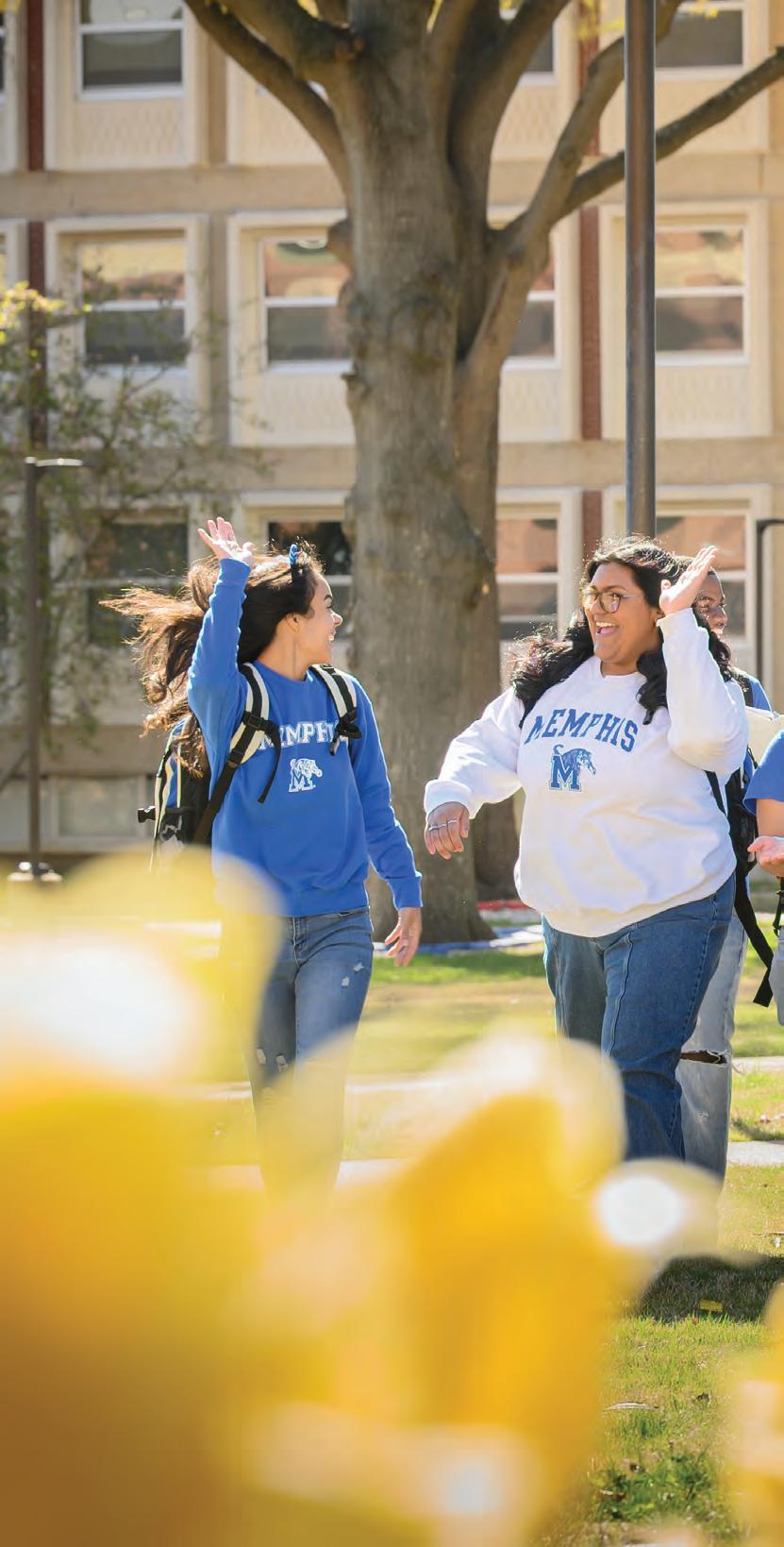

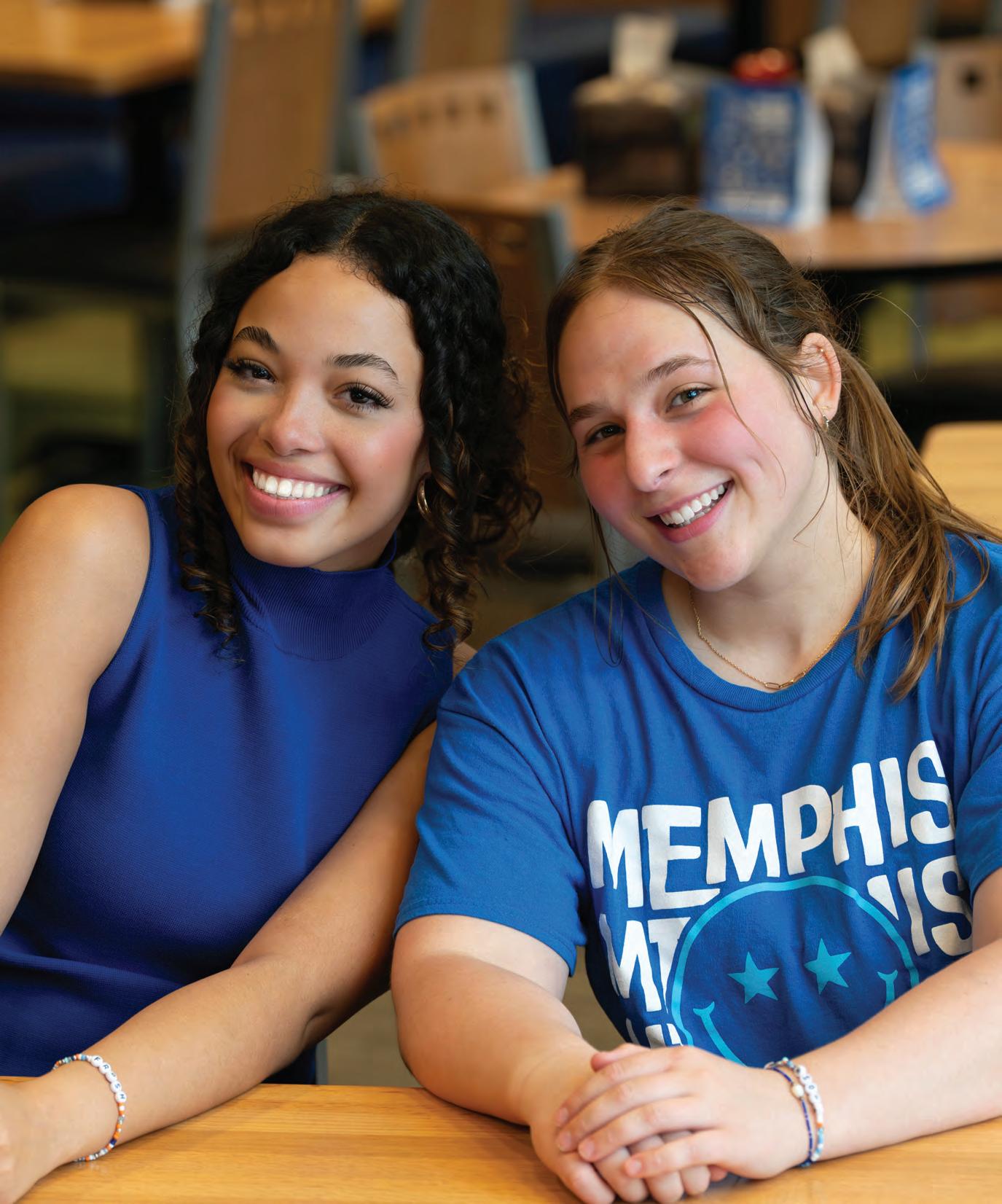
It has now been more than a year since we launched our Ascend strategic plan. When you look back at all that has occurred in that time, we can take great pride in several accomplishments.
We have further enhanced our research efforts as a Carnegie R1 institution, reaching an institutional record of $86 million in research awards last year. This remarkable achievement, which significantly surpassed the previous record of $50 million, is a direct result of the high-quality research ecosystem that our University has cultivated.
Our University Schools system continues to rank among the best in the state, and we are now working to scale that model following the recent passage of the Innovative School District Act in the Tennessee General Assembly. This legislation authorizes University Schools to become the first Innovative School District in Tennessee as part of what is already the only PreK to PhD educational system in the state.
In athletics, renovations to Simmons Bank Liberty Stadium are underway behind $50 million of support from the Frederick W. Smith Family. Through the vision of FedEx, our student-athletes are the deserved beneficiaries of a transformational name, image and likeness (NIL) program that includes a $5 million per year commitment over the next five years.
While these are impressive, attentiongrabbing accomplishments that we can proudly point to over the past year, the reality is most of the work in that first year of launching a strategic plan is not seen. But it is vital. We are laying the
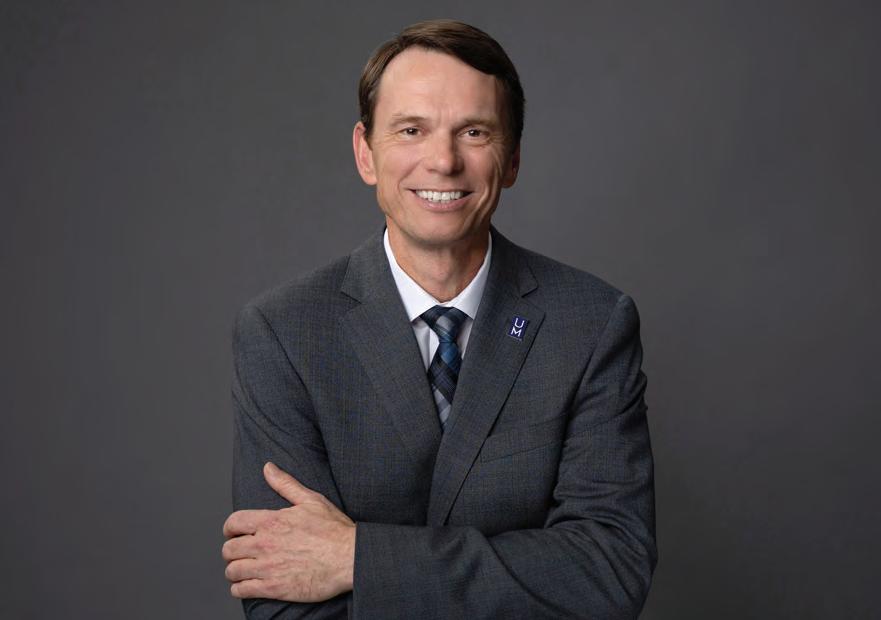
foundation for the University to achieve long-term success as a nationally recognized public research institution in a rapidly changing higher-education environment.
That foundational work will allow us to continue developing the leaders of tomorrow at the University of Memphis — an essential goal of the strategic plan. That ties into this edition of the UofM Magazine, which specifically highlights a group of our alumni who have gone on to become the leaders of tomorrow through government leadership in our city, state
and country. We invite you to enjoy the stories of how the UofM helped shape their career, as they continue to advocate for our institution and serve as inspiration for our students who aim to follow a similar path.
Thank you for your support!
GO TIGERS GO!
Bill Hardgrave President
The Frederick W. Smith Family, headed by the founder and executive chairman of FedEx, has committed a $50 million challenge gift to the University of Memphis for renovations to Simmons Bank Liberty Stadium, the home of Memphis Tiger Football, which marks the largest gift in University history. Memphis Athletics has launched a $50 million capital campaign to match the Smith Family’s significant commitment to the University.
“We truly appreciate the Smith Family for recognizing the strength of our University and athletic programs and wanting to help continue our momentum for the betterment of our entire city,” UofM President Bill Hardgrave said.
“Their substantial gift will help us chart the course of not just our football program, but our entire University, as we look to ascend nationally.”

FedEx Corp. has announced a name, image and likeness (NIL) commitment of $5 million per year for the next five years to benefit UofM student-athletes. This program presents meaningful opportunities for our student-athletes to promote key FedEx initiatives.
“FedEx has established itself as a leader in NIL with this innovative commitment to our student-athletes," said UofM President Bill Hardgrave. "The University is immensely grateful for this investment, which further strengthens the valued relationship between FedEx, the UofM and our community."
Behind the vision of FedEx, and with support from national industry experts Altius Sports Partners, the program is initially centered around football, men’s and women’s basketball and additional women’s sports. Student-athletes are provided the opportunity to capitalize on their name, image and likeness through opportunities that will include social media programs, in-person events, FedEx Cares initiatives and more.
The University Schools education model at the University of Memphis is poised to scale up following the passage of the Innovative School District Act in the Tennessee General Assembly. Sponsored by Sen. Brent Taylor and Rep. Mark White, the act authorizes the UofM to operate a local education agency as an Innovative School District, the first of its kind in the state.
The approval of the Innovative School District Act marks a new era for the University Schools, which currently operate as the training and laboratory schools at the UofM. Since the University’s founding in 1912, the University Schools have educated thousands of local students while serving as a training site for teaching candidates and related professions at the UofM.
“The University of Memphis is the only PreK to PhD educational system in Tennessee, and we now have an opportunity to scale what works by empowering the University Schools to become the state’s first Innovative School District,” said UofM President Bill Hardgrave.
“This legislation has the potential to impact the lives of thousands of students, and I am excited to see the University of Memphis carry this forward.”

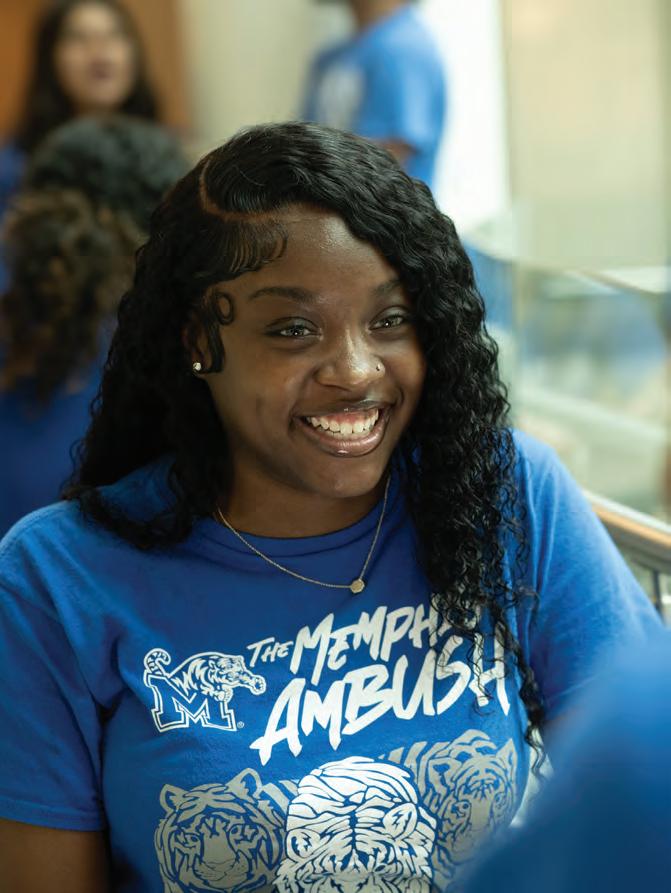
The School of Public Health at the UofM is the 2024 co-recipient of the Harrison C. Spencer Award for Outstanding Community Service. The Association of Schools & Programs of Public Health (ASPPH) gives out the prestigious national honor annually to deserving institutions that make a significant difference in their communities.
The UofM received the distinction, as the ASPPH described in the award letter, for its “unwavering dedication to addressing the pressing public health needs of our communities,” and said the award “serves as a testament to their relentless commitment to serving the most vulnerable and marginalized populations in the Mid-South region.”
Under Dean Ashish Joshi, the School of Public Health has made significant strides in the outreach and promotion of its programs. This includes introducing a dual-degree opportunity for high school seniors while creating a resource and knowledge hub in our communities, providing them with data-driven, evidence-based interventions and innovations.
The UofM will introduce a new scholarship program aimed at rewarding top-tier academic performance thanks to the generosity of Memphis philanthropist and UofM alum Burton Weil. The signature initiative will attract top-performing students from across the nation with a demonstrated history of academic excellence to the UofM. Supporting the efforts of these students is essential to maintaining the University’s R1 status.
The creation of the Weil Scholars Program has the potential to grow into one of the largest charitable gifts in UofM history. The program will offer funding opportunities to undergraduate students, graduate students and students at the Cecil C. Humphreys School of Law who have gone above and beyond in their studies. Students must achieve a specific grade point average and college entry test score to be accepted into the program.


The National Institutes of Health recently awarded $1.1 million to the mDOT Center at the UofM to continue developing cutting-edge artificial intelligence for wearables with the goal of transforming health and wellness around the globe.
Established in 2020 at the MD2K Center of Excellence housed at the UofM, the mDOT Center is a national biomedical technology research center that serves as a national hub for collaborative research. The center operates as a consortium of six institutions with Harvard, the University of Illinois Urbana-Champaign, Ohio State University, the University of California-Los Angeles and the University of Massachusetts-Amherst joining the UofM as members.
The center is led by Dr. Santosh Kumar, director of the Center of Excellence for Mobile Sensor Data-toKnowledge (MD2K) and Lillian and Morrie Moss Chair of Excellence Professor in Computer Science. The center works closely with up to two dozen grant-funded projects to jointly develop, test and deploy its novel wearables, apps, software and research design tools to advance health research.

New apartment-style student housing is planned for the UofM campus in the fall of 2026 thanks to a publicprivate partnership between the University and The Annex Group, a national developer building innovative housing communities at universities across the country.
The 540-bed student housing development will be part of the Park Avenue Campus, which is also the future site of Tiger Park, the integrated academic and athletic facilities complex to be carried out in phases over the next decade.
“The upcoming housing development on our Park Avenue Campus will give our student-athletes a significant competitive enhancement to live where they train," said UofM President Bill Hardgrave. "This first-class facility will help tremendously in recruiting for our athletic programs and assist in building a sense of community across our University with student-athletes living alongside others in our student population. We greatly appreciate everyone involved for helping make this much-anticipated facility a reality.”

The University of Memphis Lambuth campus in Jackson, Tennessee, will soon be home to one of the University’s largest graduate programs when the newly approved Doctor of Physical Therapy (DPT) program begins in fall 2026.
The DPT program is housed within the College of Health Sciences (CHS) and anticipates accepting 40 students per year. The program will focus on developing future leaders interested in providing rural health care to underserved patient populations.
Dr. Jacque Bradford, who joined the CHS faculty in January 2024, is leading the new program as its director.
“I am deeply honored and humbled to be appointed program director, and to develop this long-awaited program at the University of Memphis,” Bradford said. “The University has truly played a pivotal role in shaping my professional career, and I am excited about this opportunity to give back through the DPT program and the CHS. By preparing skilled and compassionate physical therapists, I will strive to create a culture of excellence, innovation and collaboration in service to Jackson and West Tennessee.”

The DPT will welcome its first cohort seven years after the CHS initially began developing the program.
“It has been a long and challenging endeavor,” said CHS Dean Dr. Richard Bloomer. “We are grateful to have reached this point and for Dr. Bradford to join our faculty as the leader of this new program."
Bradford is a three-time UofM graduate, receiving her Bachelor of Science in Education in Exercise and Sports Science, master’s degree in Human Movement Science and Doctor of Education in Instruction and Curriculum Leadership. She earned her DPT at the University of Tennessee Health Science Center (UTHSC), where she went on to serve as director of Clinical Education and program director in the DPT program.
“I am excited that the DPT will be added to our list of doctoral programs,” said Graduate School Dean Dr. Deborah Tollefsen. “Dr. Bloomer and his colleagues should be commended on their hard work in establishing the program. I am thrilled to welcome Dr. Bradford to the University of Memphis and look forward to working with her and her colleagues to support their graduate students.”
Its huge windows let sunlight stream inside and illuminate a large, multi-level common area. Professors and students mingle around the bright, open space. Groups of professionals wearing slick business attire are ushered through the impressive space to private executive conference centers. Clusters of students utilize the large study pods to collaborate on projects. The delicious smells from the international café fill the space with warmth and invite the occupants to stay and eat.
This isn’t the Google or Apple headquarters, it’s the brandnew Robert and Avron Fogelman Business Complex. This vision for the newly renovated Fogelman College of Business & Economics (FCBE) will soon be a reality.
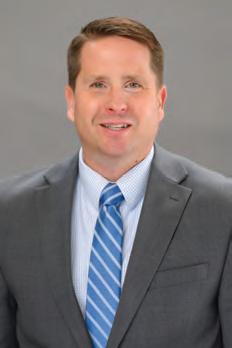 Dr. Bobby Garrett
Dr. Bobby Garrett

The renovation of the FCBE buildings is not just about updating the bricks and mortar; it acts as a bold promise to continue shaping the future of business education, and the Memphis community, for the better.
FCBE Dean Dr. Bobby Garrett arrived at the University of Memphis in early 2023 and has dedicated himself to enhancing the future of the college. Together with a strategic planning task force that includes faculty, staff, students and community partners, Garrett honed a strategic vision for the FCBE.
“The University of Memphis is a first-generation student forward campus,” Garrett said. “We're a majority-minority campus and our students are coming here because they're looking for opportunities. We're positioning ourselves as the college of opportunity to serve the unique population of Memphis and this region, to make sure that our students get the support they need.
“That does not mean that we reduce any of our academic rigor. We are an academically rigorous college full of integrity, and we expect our students to be able to meet and beat the challenges that we put in front of them. What it does mean is that we build a scaffolding of support around our curriculum because we care for our students.”
Garrett describes opportunity as a holistic concept. The support also extends to the faculty, staff, alumni and corporate and community partners to help build this foundation for success and opportunity. This project will be a huge factor in maintaining and expanding this legacy into the future.
Improvements to student and faculty life are the paramount objectives for the new construction. According to a study by TeenLife, students who visit a college before they apply are 40% more likely to apply and be admitted. If these students don’t connect with the facade of the FCBE buildings, the UofM could be losing prospective students.
“One of the primary pieces of this building project is that we want to make sure we have a space that is impressive, welcoming and represents our values as a college,” Garrett said. “We want the students to feel that and feel like this could be a home for them.”
The renovation would see the dated brick exterior of the current FCBE replaced by large windows and a sleek new design. The formerly separated FCBE Administration Building and Classroom Building will be connected to promote collaboration between students and faculty while also serving as a modern common space for studying or working.
“It's going to put all the student services front and center in an indoor open area that represents our values,” Garrett said. “We'll be reconfiguring walls and classrooms, taking some of the tiers out of the classrooms and making them flat spaces so there's better

opportunities for collaborative pedagogies and for students to meet with each other.
“There’s going to be a greater focus on student study spaces and small team rooms where students can go to work with technologyenabled spaces. Right now, our students come in for classes, and because we don't have the space for them to study, they leave. What we need to do is create spaces that give them the opportunity to stay.”
The new building will provide muchneeded enhancements for FCBE faculty and staff as well. With the cramped quarters, some employees are currently doubling up office space and battling with outdated climate controls.
“Spaces have an effect on workforce engagement and productivity,” Garrett said. “Having the right spaces for our faculty and staff will improve morale and productivity, and make it much easier for us to get all of our personnel to be committed and engaged to the mission of the college.”
As Fogelman thrives, so too does the entire University of Memphis community.
“The more University of Memphis students have employment opportunities in general, the more attractive this place becomes to prospective students,” Garrett said.
“That doesn't mean every student needs to be a Fogelman student. It means that we're willing to serve all the students at the University of Memphis by giving them micro-credential programs or minors in our college so that if they're an art student or music student, they can come out with some understanding of business that will help them find success in their chosen career.”
This commitment to serving UofM students across many disciplines highlights the pressing need for expansion. The current buildings have capacity for about 3,000 students. This is already too small for Fogelman’s roughly 3,600 current students, which illustrates why this renovation is critical for both the FCBE and the University.
Many UofM supporters have awaited this pivotal project, recognizing its potential to uplift not only the
academic experiences of students, but also to empower the next generation of business leaders rooted in Memphis.
Garrett is emphasizing to the Memphis community that this project is moving forward full steam ahead. Ongoing support is not only beneficial but vital to the project's success and ensuring the goals set will be fully attained. It is a critical strategic investment for the entire UofM and its community.
“My job is to steward over this organization and its assets in such a way that in five or 10 years, our graduates become even more proud to declare that they have a degree from the University of Memphis, and it becomes all the more valuable for them to say that,” Garrett said.
A project of this scale creates a ripple effect of innovation, collaboration and educational impact that reaches across disciplines and elevates the UofM and the Memphis community to new heights of distinction.
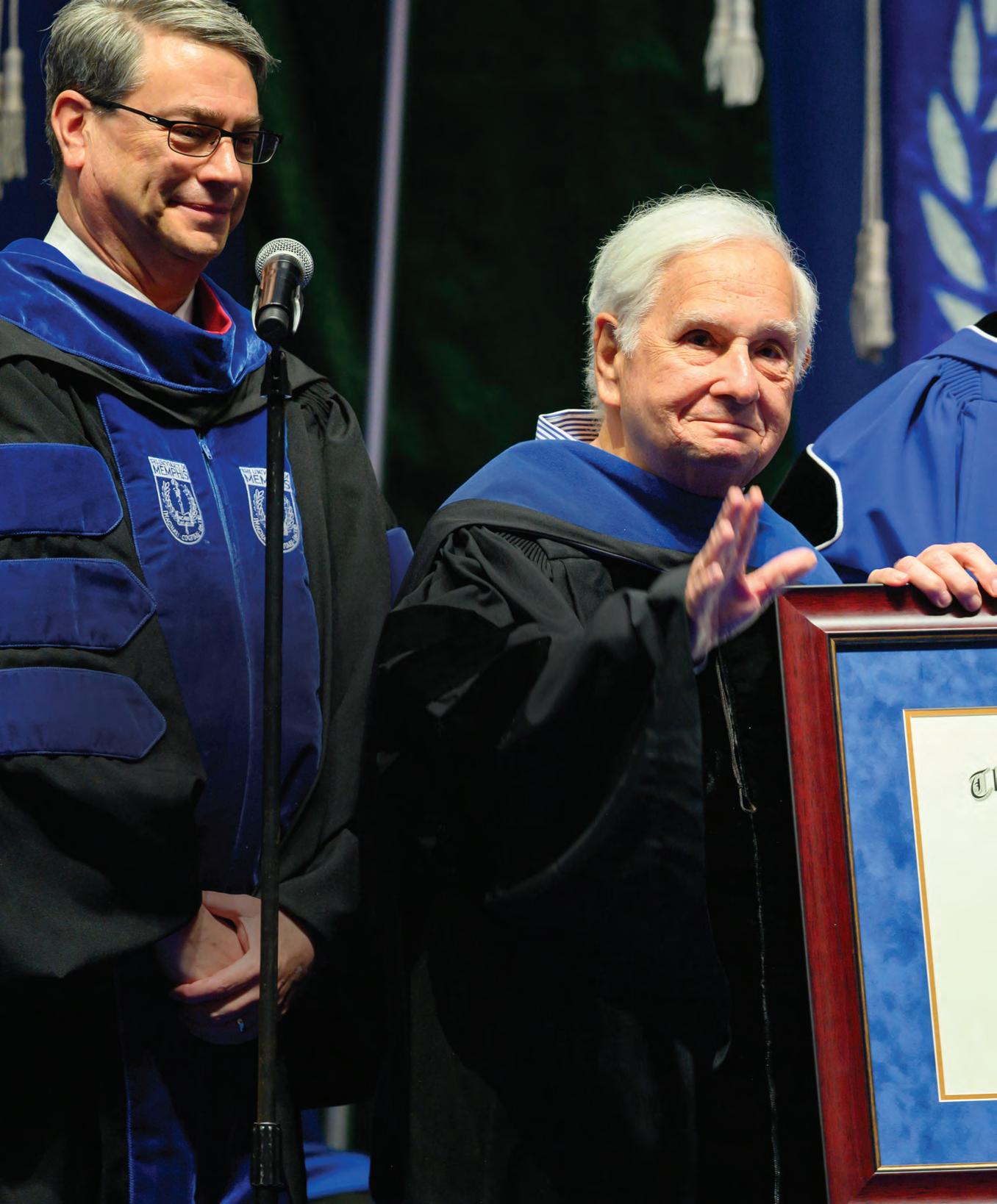
University of Memphis President Bill Hardgrave presents an honorary doctorate to Avron B. Fogelman during the Spring 2024 Commencement at FedExForum, recognizing his longtime dedication and commitment to the UofM.
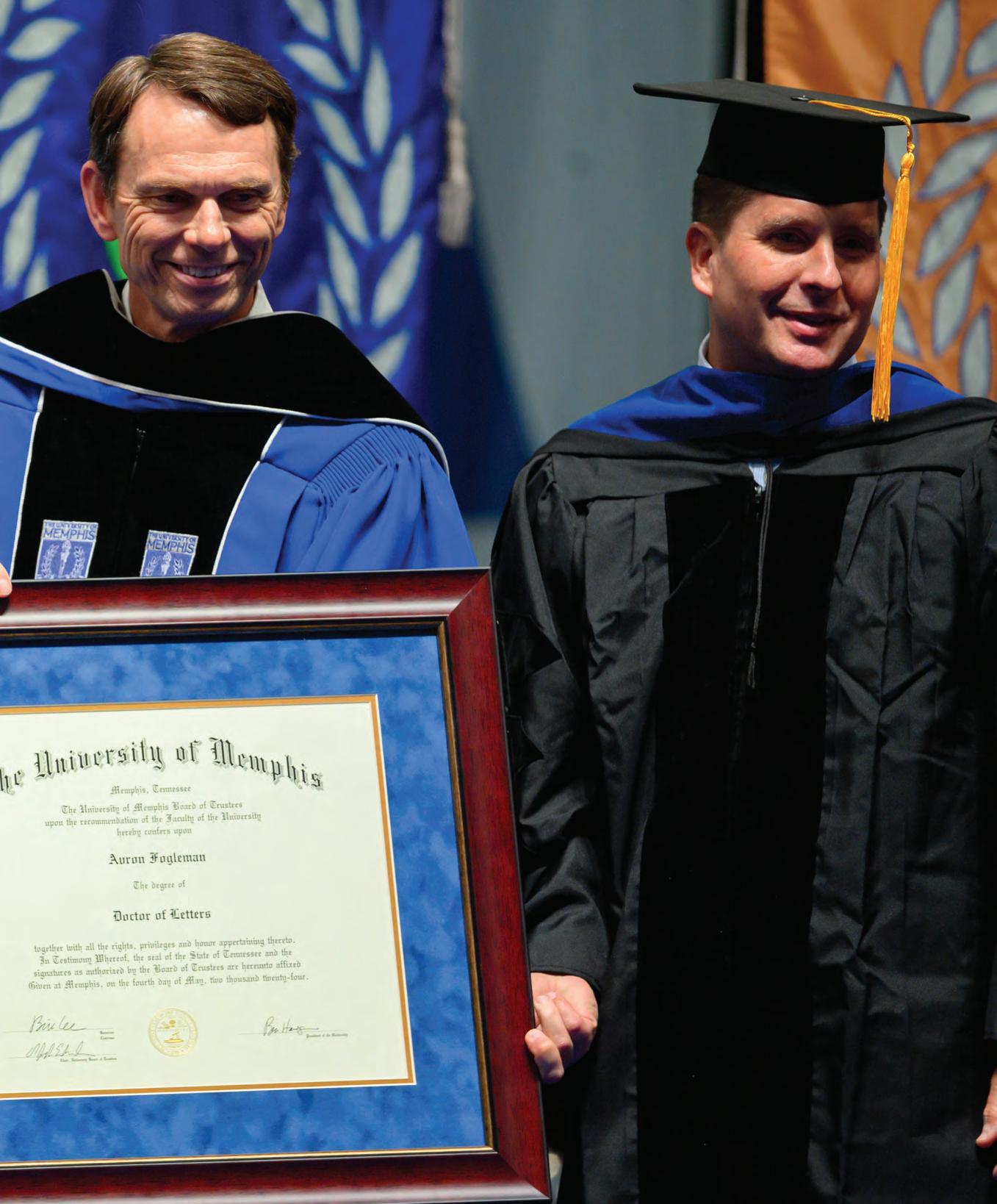
The University of Memphis recently set a remarkable record. Not in sports or research, but in community impact, thanks to the Bruns Scholarship Challenge.By Nia Rincon
In September 2020, alumni and friends of the University were challenged by philanthropist Mike Bruns and his wife, Marian, to support students by committing an initial $1 million to launch the scholarship challenge. The endowed scholarships they created were matched 1:2 until the initial $1 million challenge fund was fulfilled. In total, 36 new scholarships were created with $3 million raised in three years.
Bruns is a successful entrepreneur, philanthropist and longtime UofM supporter. He is the founder and former president of Comtrak Logistics, a national transportation and logistics company headquartered in Memphis. A consistent champion for those experiencing hardship in our community, Bruns’ passion to make Memphis a better place is evident in his willingness to share his time and expertise. His efforts have forever changed
the lives of many UofM students who are empowered by his generosity.
“I am excited to offer my support to the University of Memphis because of its deep commitment to providing young people from all backgrounds the opportunity to excel and earn a degree,” Mike Bruns said. “When I learned that awards of as little as $700 can make a difference between a student graduating and dropping out, I knew I had to help.”
Lakaiyah Givens-Smith, a first-generation senior studying Public Health, is one of many students the Bruns Scholarship Challenge has allowed to stay enrolled and on track. As part of her capstone to complete her degree, Givens-Smith was required to design and pitch a research project to a local non-profit. It also required 100 hours of unpaid fieldwork,

making it impossible to attend classes full-time, work part-time and continue with the course.
With Givens-Smith facing the reality of being unable to pay for her education, the Bruns Challenge provided her with a matched scholarship that allowed her to conduct field research and attend classes.
“With that scholarship, I had the comfort of not working for a semester while completing the required fieldwork,” Givens-Smith said. “I was able to really pour into my project and my other classes. I was so grateful that I was a scholarship recipient.”
After having the opportunity to volunteer with Project STAND, Givens-Smith ultimately chose to partner with Neighborhood Christian Centers and conduct focus groups at all seven sites to research how gun violence affected the youth of Memphis. She had discussions with groups of teens from around the city and then conducted surveys to better understand the impact of gun violence.
“I was someone who wasn't from here seeing the neighborhoods they live in and how they don't have community
centers or resources like grocery stores, which I had back home,” said Givens-Smith, who is originally from Little Rock, Arkansas. “It really made me want to be a service to the youth because they don't know that their circumstances are bad. I also wanted to shed light on how gun violence is normal to them.”
For students like Givens-Smith, whose research strives to make Memphis a safer place for all, Mike Bruns’ enduring commitment to the UofM has been a catalyst for positive change.
This collective effort not only enhances the academic landscape but also addresses real-world challenges faced by the community. The Bruns Challenge’s impact extends far beyond financial contributions and manifests in the real-world outcomes of students conducting life-changing research.
A worry-free education is the key to unlocking a brighter future for all. Together, with the support of individuals like Mike and Marian Bruns, the UofM will continue empowering futures and transforming lives for generations to come.

nside the Maxine A. Smith University Center Ballroom, University of Memphis seniors excitedly line up to participate in a beloved University tradition. The tables are decorated with festive flowers and décor with fine china and wrapped silverware expertly arranged at each seat. As the seniors file in and choose their seats, servers fill their glasses. There is a palpable buzz in the air as the room begins to fill. This isn’t a fine dining restaurant experiment, it’s the Senior Class Luncheon.
This completely donor-funded event is dedicated to celebrating the senior students’ hard work and sends them off on the next phase of their journey feeling accomplished. Door prizes tailored to young professionals are raffled off. The seniors also get a chance to hear their class president and other peers share words of wisdom and congratulations. Now in its 10th year, this tradition has become a favorite.
The Senior Class Luncheon would not be possible without the generosity and vision of George (BBA ’70) and Betty Johnson (MEd ’75). Through the creation of several endowed scholarship opportunities and philanthropic programs — including the Distinguished Professorship Award; the George Johnson Research and Teaching Fellowship Award Program; the Senior Scholarship Program and the Senior Luncheon — the Johnsons’ generosity has made a lasting impact at the UofM.
George Johnson is a member of the UofM Board of Visitors and past president of the University of Memphis Foundation. The impact of George and Betty on the University has also been recognized with a Distinguished Alumni Award, one of the University’s highest honors.
“Being a citizen of this city, it is apparent to me the importance of this University to the well-being of the community,” George said.
“I have been fortunate in my business career, and I want to help students achieve their potential and be an asset to society.”
By Nia RinconThe event is a testament to the transformative impact that a single individual can have on the lives of many, turning a milestone celebration into a memorable and heartfelt experience for graduating seniors.
The Johnsons’ inspiration for the event came after attending the graduation of their daughter from the University of Virginia, where a student speaker mentioned one of his favorite memories being their senior lunch. When they discovered the UofM didn’t yet have this tradition, the Johnsons volunteered to sponsor it.
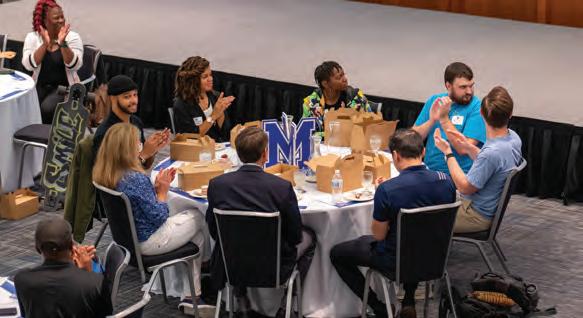
“This luncheon was always intended to be a reward for the hard work of the seniors for their accomplishment but to also encourage them to help Betty and I start the Senior Class Gift,” George said.
The Senior Class Gift is a campaign designed to encourage senior students to pay it forward by supporting scholarships for the incoming freshman class. It also acts as preparation for their transition into the alumni community and any future giving.
By matching the contributions of seniors, Johnson has created a way to instill philanthropic ideals in each senior class that they carry into the future.

I love the city of Memphis, and I am dedicated to doing whatever I can to make it a better place to study, work and live.”
“I am truly grateful for this scholarship; it allows me to focus on my studies without the additional financial stress,” said Zakeria Williams, a sophomore who is a recipient of a Senior Class Gift Scholarship.
“I have the opportunity to be more involved in my community and on campus. It really means the world to me to be able to follow my dreams of becoming a nurse. I cannot wait until I am able to give back to my fellow Tigers.”
When the seniors give back, they uplift all of the students who come after them and allow them to focus on their studies without financial worries.
“It has given Betty and I great pleasure to see the students and to thank them for choosing the University of Memphis and to congratulate them for their impressive accomplishment,” George said.
“I love the city of Memphis, and I am dedicated to doing whatever I can to make it a better place to study, work and live.”
In the heart of our Tiger community, Johnson’s impact is undeniable. His generosity has set a powerful example of positive change, touching lives and brightening the future for UofM students. His influence shows the profound difference that one single person can make in the collective well-being of thousands of individuals.
In the words of former University President Dr. M. David Rudd, “His caring is only rivaled by his impact.”
t’s no secret that government service — including elected office — is built on relationships, and perhaps no credential is more powerful if you’re interested in government or public service in this part of the world than a degree from the University of Memphis. In this edition of the University of Memphis Magazine, we profile some of the many remarkable UofM alumni who have chosen government service, in one way or another, as a career.
These civic leaders remember their time at the UofM fondly, from the professors they had to the friends they made, even if it’s been decades since they were on campus.
“The University of Memphis allows for an environment where our future elected officials get to know each other in getting to know the city,” said Katie VanLandingham, former UofM Vice President, Governmental and Community Affairs.
Many students who later end up in government service participated in
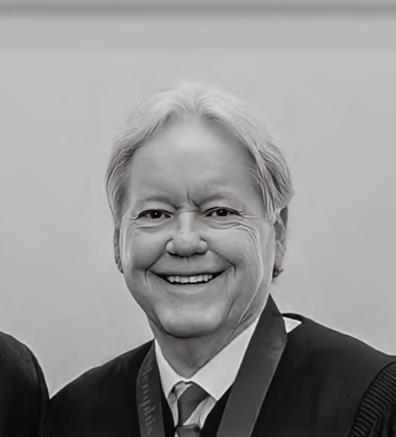

the Tennessee Intercollegiate State Legislature through the UofM, according to VanLandingham, “which allowed them to meet other political leaders from across the state. Getting to network with each other really helps them in their political careers, because they rise through the ranks together.”
The University is also a major player in facilitating grants and other state initiatives in West Tennessee and in partnerships across the state, which Ken Moody, Senior Director of Local and Community Relations, discovered when he began working at the UofM in 2023.
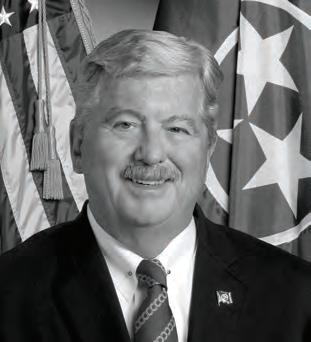
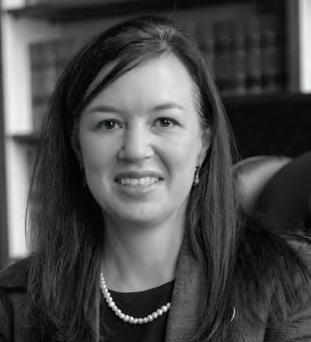
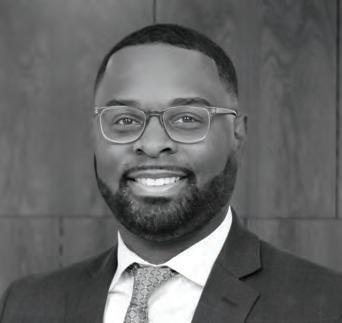

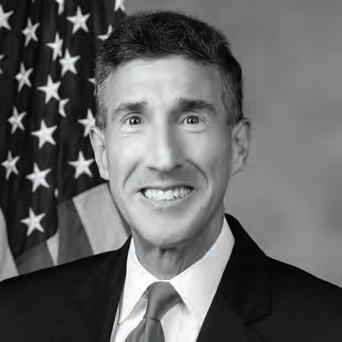
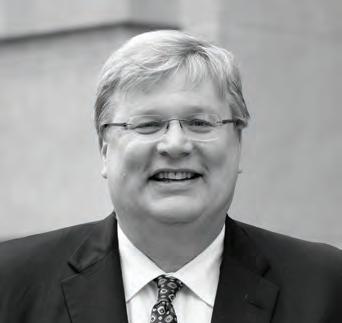
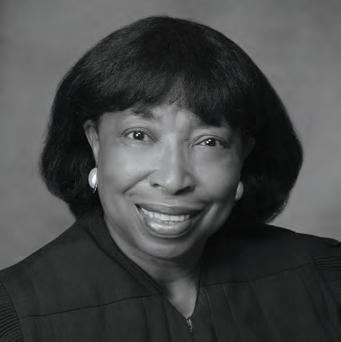

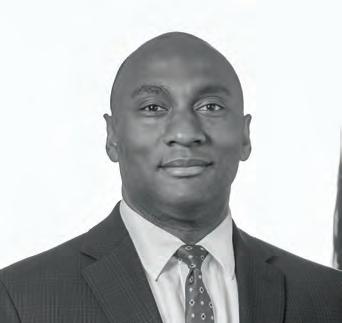
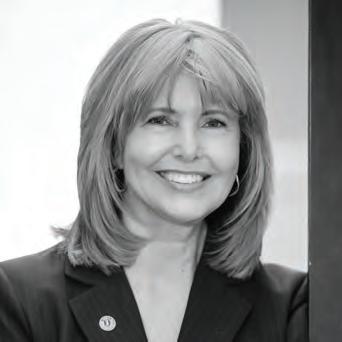


THE UNIVERSITY OF MEMPHIS ALLOWS FOR AN ENVIRONMENT WHERE OUR FUTURE ELECTED OFFICIALS GET TO KNOW EACH OTHER IN GETTING TO KNOW THE CITY.”
“This University is broadly involved in this community in more ways than people even know,” said Moody, a two-time UofM graduate. “We’ve got so much to offer, but we have to make sure the community knows what we’re doing and that we’re always looking for ways to work better with them.”
Alumni who have carved a career in government service play a unique role in the future of both the University and the areas it serves. The UofM is eager for their help.
“We love to see our elected officials visiting campus to see the changes that have happened since their time at the University of Memphis,” VanLandingham said. “We are really lucky to have alumni who care in these positions. A lot of them have stepped up in times when they were really needed; and even now, they call us and ask how they can help, how they can be a part.
“That’s so important. It’s up to the alumni to help with the trajectory of where the University goes next.”
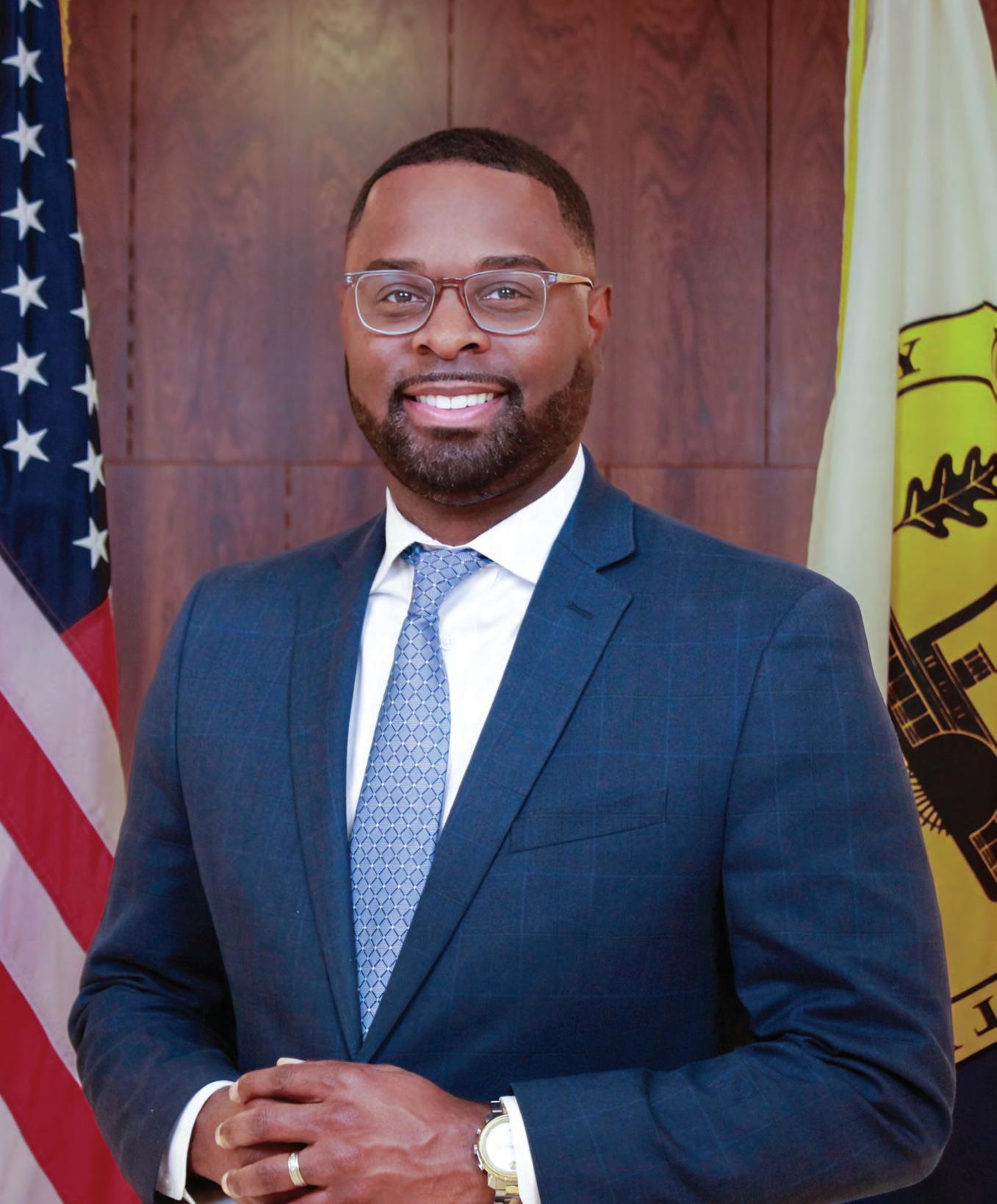
“I KNEW I WANTED TO REBUILD NEIGHBORHOODS IN MEMPHIS. THE UNIVERSITY OF MEMPHIS WAS THE LOGICAL PLACE TO LEARN HOW TO DO THAT.”
LEADERS LEARN

When current City of Memphis Mayor Paul Young came back to town after finishing his undergraduate degree at the University of Tennessee, he wasn’t sure what to do next. Then one day he listened to his mother, Pastor Dianne Young, preach a sermon about a purpose-driven life and had a spiritual reckoning.
“I knew I wanted to rebuild neighborhoods in Memphis,” he said. “The University of Memphis was the logical place to learn how to do that.”
His graduate program in urban planning was immersed in the community, with different partners and nonprofits who were part of the program.
“For the first time, I was doing something that felt like a calling,” Young said. “The way the program was structured, the engagement of the faculty and staff and the clear commitment to the purpose of helping to build great cities inspired me.”
He earned his planning degree in 2005 and an MBA in 2010 (also from the UofM) and went on to planning and leadership positions in Memphis and Shelby County, serving as Director of the city’s Housing and Community Development office before becoming CEO of the Downtown Memphis Commission. Young was elected Mayor in 2023 and officially took office Jan. 1, 2024.
“Everything I’m doing now is the result of the experience I had at the
University of Memphis,” he said. “The Mayor’s role is the epitome of community development, and I have a significant opportunity to help rebuild this community. The University ignited my mind around all the possibilities.”
He stresses the UofM should be viewed as a widely appreciated asset in Memphis.
“I think we don’t realize how important it is to have a university that uses the city for a lab,” he said. “The University provides so much intellectual backbone to all kinds of initiatives and programs. It’s our talent pipeline and will play a significant part in ensuring the future of our city.”

As an undergrad at the University of Memphis, former City of Memphis Mayor Jim Strickland was a finance major, even though he knew by his junior year that he didn’t want to do that for a living. So, the president of the student body his senior year decided to go to law school (again, at Memphis), because “you can do a lot of things with a law degree.”
Strickland has no doubt that graduating from the UofM Law School helped his political career. Today, he is dean of the Law School, a position he accepted in March after his final term as mayor concluded at the end of 2023.
“Lawyers are trained to do several things that translate to the political
world,” he said. “You work long hours, and research issues with which you’re not familiar and understand them well enough to explain them to others. You also learn to argue and disagree with another person and not make it personal.”
There was never a question that he would stay in Memphis, and he is forever grateful to the University.
“Whatever I’ve accomplished in my professional life is in large part because of the seven years I spent at the University of Memphis,” he said. “It gave me a great balance of intellectual rigor with practical, reallife experience. I loved that mix.”
His political career — he worked at Glankler Brown, founded his own legal
practice and served on the Memphis City Council before he became Mayor — showed him the enormous value of the University to the city.
“Keep in mind that the UofM is our biggest producer of employees. The better the University does, the better the city does,” he said.
A longtime season ticket holder for both basketball and football, Strickland has passed his love for the University along to his son, a senior.
“You meet great professors and get a great education,” he said. “It was true when I went there, and it’s true now for my son.
“I love the University of Memphis.”
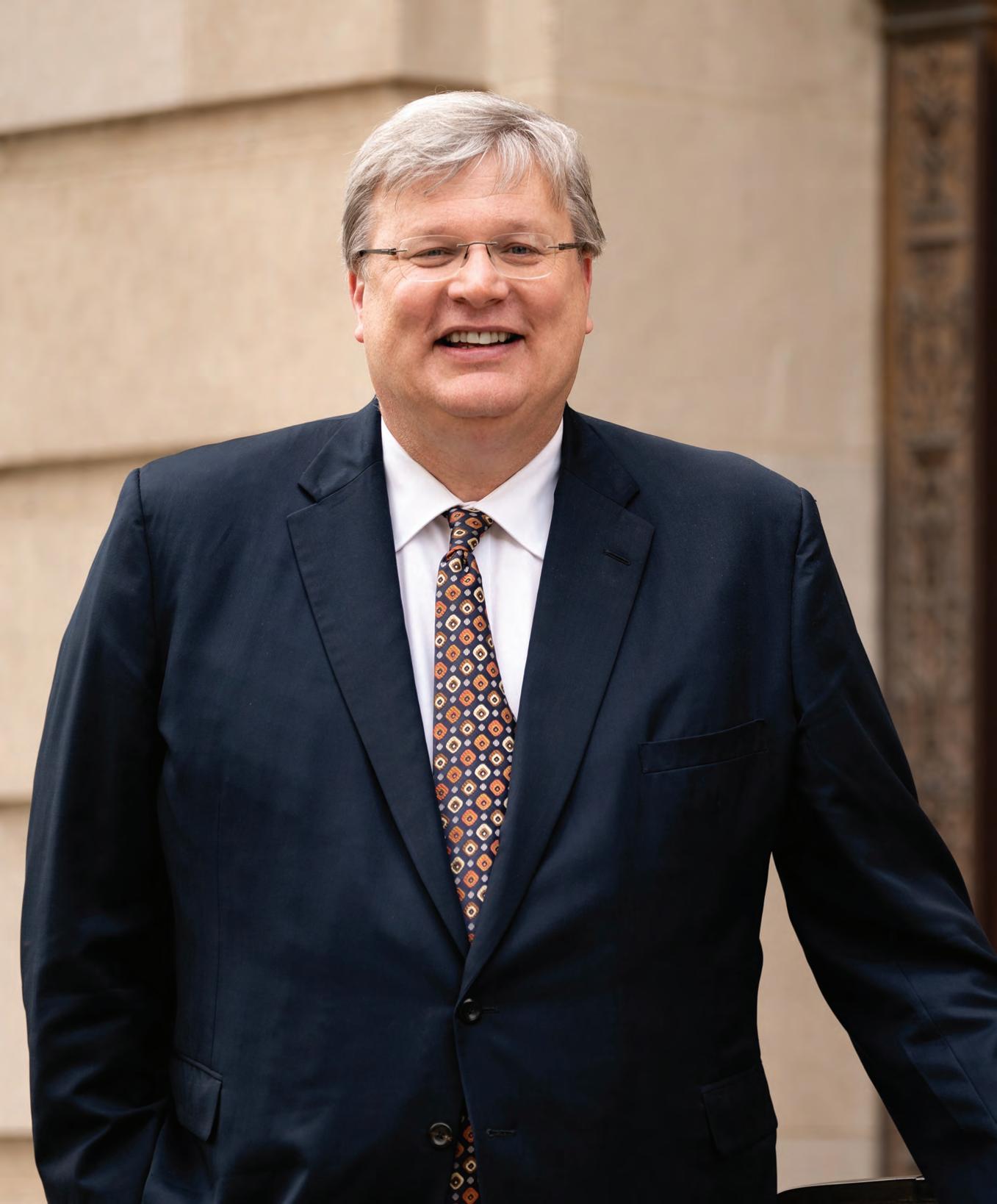
“WHATEVER I’VE ACCOMPLISHED IN MY PROFESSIONAL LIFE IS IN LARGE PART BECAUSE OF THE SEVEN YEARS I SPENT AT THE UNIVERSITY OF MEMPHIS.”

“THE WHOLE COMMUNITY DEPENDS ON THE SUCCESS OF A THRIVING DOWNTOWN, AND THE LAW SCHOOL IS AN ANCHOR AND A CRITICAL PART OF THE UNIVERSITY SYSTEM.”
LEADERS LEARN HERE

County Mayor
Shelby County Mayor Lee Harris arrived at his University of Memphis journey only after transitioning from learner to teacher.
A native Memphian, Harris graduated from Overton High School and headed off to Morehouse College, then went to Yale Law School, from which he graduated in 2003.
“I loved law school — loved the debate and discussion as part of my law school education,” he said. “I knew one day I’d be back on a higher ed campus, though I didn’t know it would be in my hometown.”
After law school, Harris moved back to Memphis and became an associate
at Baker, Donelson, Bearman, Caldwell & Berkowitz. Then, in 2005, he was hired as a full-time professor in the UofM’s Cecil C. Humphreys School of Law, teaching classes in contract law and corporate law. Harris earned tenure in 2011, becoming the first tenured African American full professor in the law school’s history. In 2012, he was named the inaugural FedEx Professor of Law.
“The students were incredible, it was a great environment with people incubating great ideas,” he said.
Harris left teaching full-time in 2018 when he was elected Shelby County Mayor. Prior to that, in addition to his teaching, he served on the
Memphis City Council and in the State Senate, where he was the youngest senator in the state at the time.
He hasn’t stopped being an advocate for the UofM and the law school, though, especially since it moved downtown.
“The whole community depends on the success of a thriving downtown, and the law school is an anchor and a critical part of the university system,” he said. “It was a catalyst for young people moving downtown. We take it for granted now, but it wasn’t always like that.”

When Lieutenant Governor and State Senator Randy McNally took the train across Tennessee from his hometown of Oak Ridge in 1962 to enroll as an undergrad at then-Memphis State University, the campus was very different from today. He lived in the dorm (East Hall), pledged a fraternity (Sigma Phi Epsilon) and majored in biology with a minor in physical sciences, ultimately graduating in 1967 with a Bachelor of Science.
“We enjoyed the town,” he said. “You could walk to most restaurants and places you’d want to go. At first, I was looking at pre-med, but I had too much fun in Memphis and didn’t have the grades, so I went
on to the pharmacy school (also in Memphis, but part of the University of Tennessee), which turned out well.”
He also got involved in political campaigns when he was in Memphis and enjoyed the work.
“When I was getting ready to come back to Oak Ridge,” he said, “I called Winfield Dunn, who was considering running for governor and was fairly well known in Memphis, and he was very kind. I worked in his campaign and in Bill Brock’s campaign, too.”
Later, when there was an open seat in the legislature, he ran for it and won. Early in his legislative career, McNally worked with the TBI and FBI as a secret informant in the
Rocky Top investigation of political corruption in the late 1980s.
Though he built his career in East Tennessee, McNally appreciates the role the University of Memphis plays in the state. “It’s really the higher ed anchor for West Tennessee, and it’s grown substantially since I was there,” he said.
His favorite Memphis memory?
McNally was at the Sept. 21, 1963, football game at Crump Stadium when Memphis tied Ole Miss, ranked No. 2 in the nation at the time. The early-season result propelled the Tigers to an undefeated season.
“That was a good one,” he said.
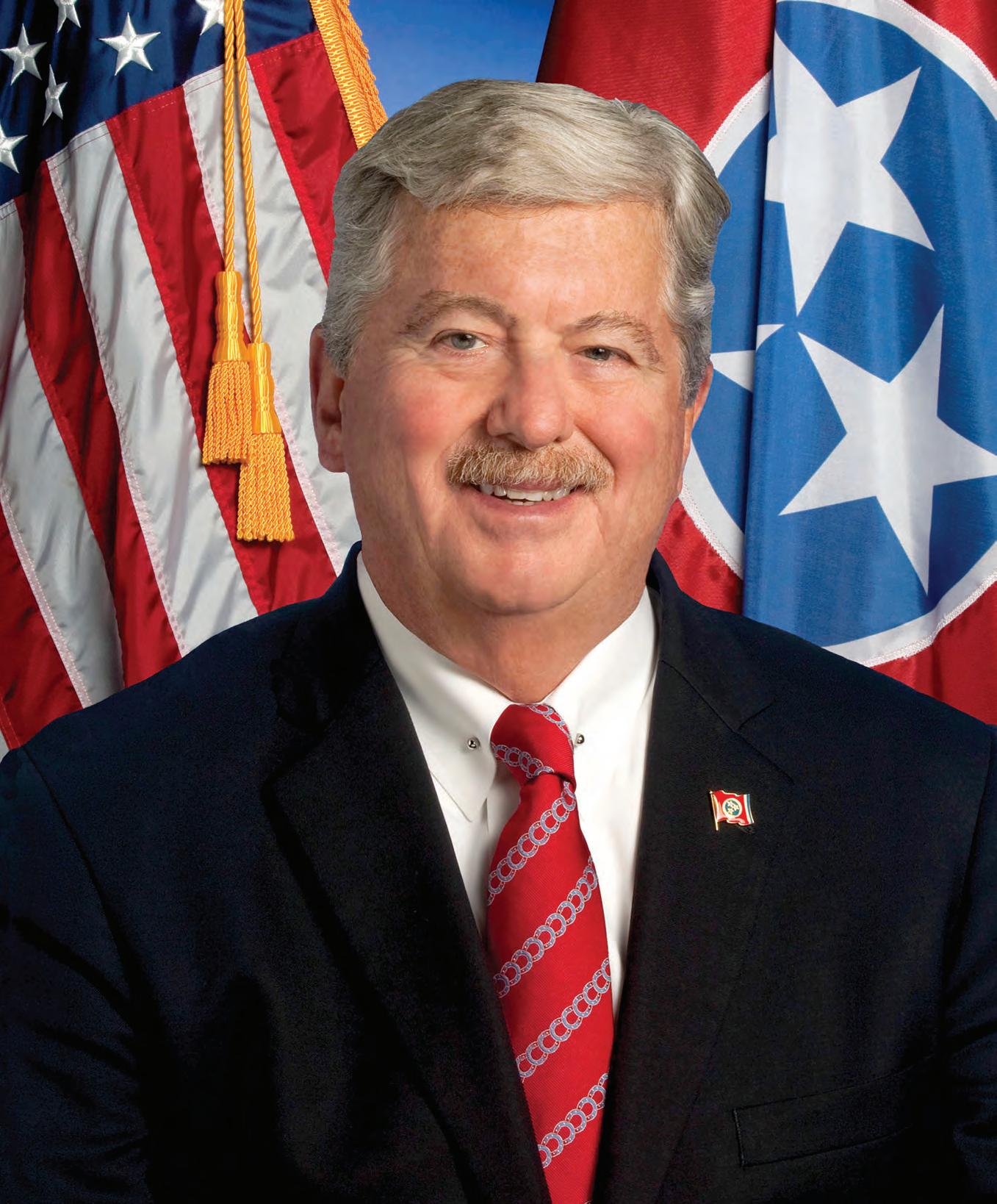
“(THE U of M) IS REALLY THE HIGHER ED ANCHOR FOR WEST TENNESSEE, AND IT’S GROWN SUBSTANTIALLY SINCE I WAS THERE."
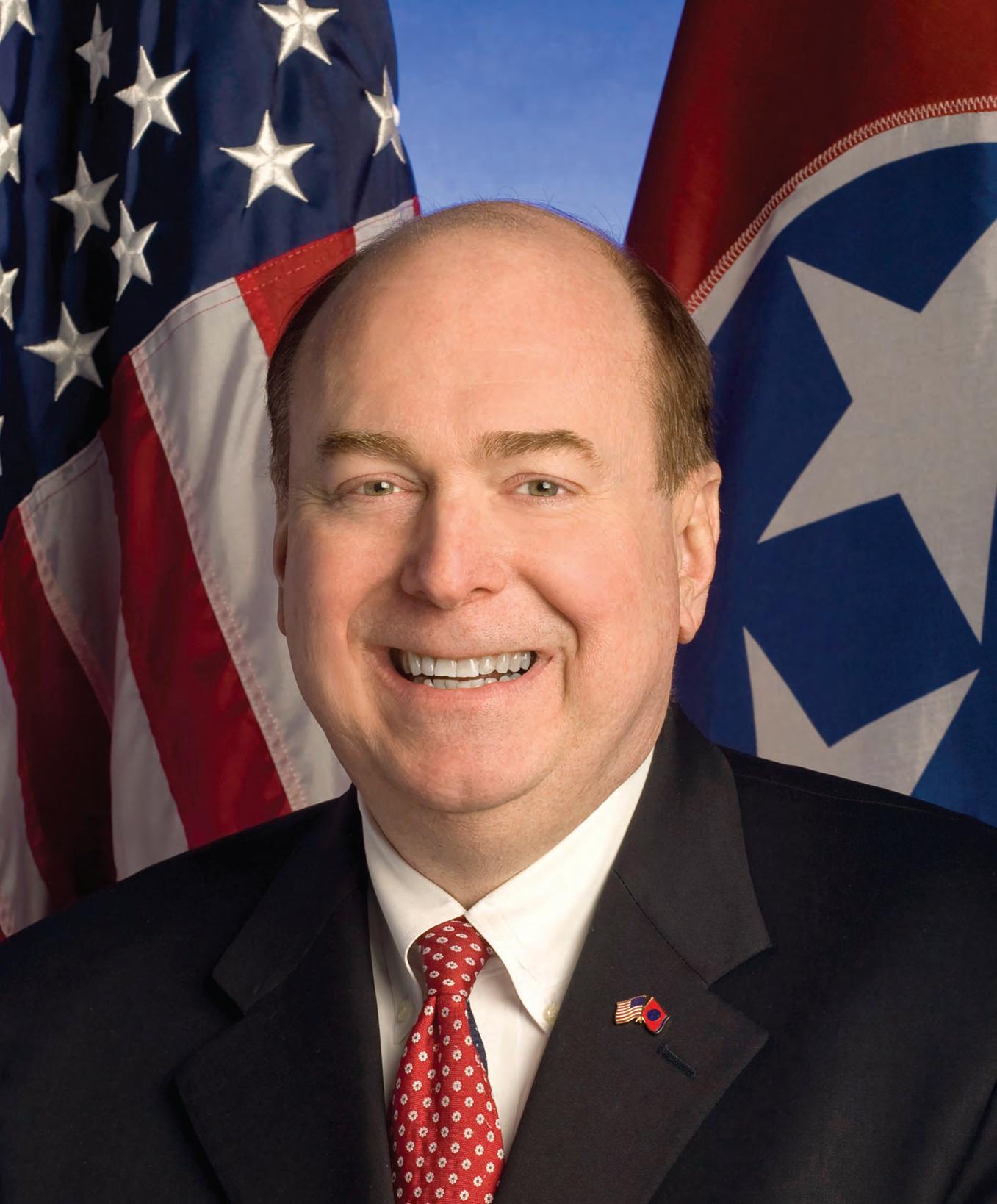
“THE U of M SUPPLIES A REALLY GOOD, SOLID EDUCATION FOR ITS STUDENTS, WHATEVER FIELD THEIR DREAMS HAPPEN TO BE IN.”

As an undergraduate at the University of Memphis, David Lillard Jr. got involved in student government and began to envision a career in politics and government service.
“My major was political science and I was involved in the Tennessee Intercollegiate State Legislature; I ultimately became governor,” he said. “The University of Memphis gave me a lot of great life experiences that I wouldn’t have traded for the world.”
In particular, Lillard pointed to the opportunity he received as a 20-year-old to work as an assistant to several state legislators in Nashville, as well as several clerking
opportunities, including for the Army Corps of Engineers, in law school.
After 28 years in private practice as a tax attorney at Burch, Porter & Johnson in Memphis, Lillard was elected by the Tennessee Legislature to serve as Treasurer in 2009. He is responsible for the management and investment of approximately $120 billion, supervises 300 employees and runs programs from risk management to the TNStars 529 program for college savings.
“We’re helping to send students to the University of Memphis (with that program),” Lillard said. “We also run the retirement system for the state, which employees at the University of Memphis are in.”
His connections at UofM are strong and ongoing.
“I work closely with President Hardgrave, trying to enhance the University’s effectiveness and reach,” he said. “I was also very involved when the University acquired the Lambuth property up in Jackson.”
Lillard is proud of the University’s growing recognition across the country for excellence in research.
“What’s important, too,” he adds, “is that the UofM supplies a really good, solid education for its students, whatever field their dreams happen to be in.”

As a senior at Olive Branch High School, Bernice Donald faced a “hostile environment” because she and her classmates had recently integrated the school.
“The principal wouldn’t let guidance counselors give any of the Black kids information on going to college or getting scholarships,” Donald recalled.
But she knew about Memphis State University, so she applied and was accepted. Then came the preview visit for accepted students.
“I was one of 10 kids and the first of my siblings to go to college; I didn’t have a mentor I could ask about this experience,” she said.
She figured college must be a lot like church, so her mother made her a “beautiful, pink, high-bodice dress.” Her parents got dressed up as well, and they all headed to campus.
“People all around us were in jeans; we felt like aliens,” Donald said. “But I was so proud to be there. I was transported by my experience at the University of Memphis. It lifted me beyond my circumstances and introduced me to a world I didn’t even know existed.”
Donald graduated with a degree in sociology in 1974 and from the UofM Law School in 1979. She worked for both Memphis Area Legal Services and the Public Defender’s Office before beginning her history-making judicial career.
She was the first Black woman in the state to be elected a General Sessions Criminal Court judge and the first Black woman in the country to become a U.S. bankruptcy judge. In 1985, she was nominated to the federal bench; in 2011, President Obama nominated her to the U.S. Court of Appeals for the Sixth Circuit, where she was also the first Black woman to serve. She retired from the bench in 2023 and is still deeply involved with both the University and its Law School.
“At the University of Memphis, you can get a first-class, highquality, economically accessible education,” Donald said. “We are competitive by every metric and are still the best ticket in the region.”
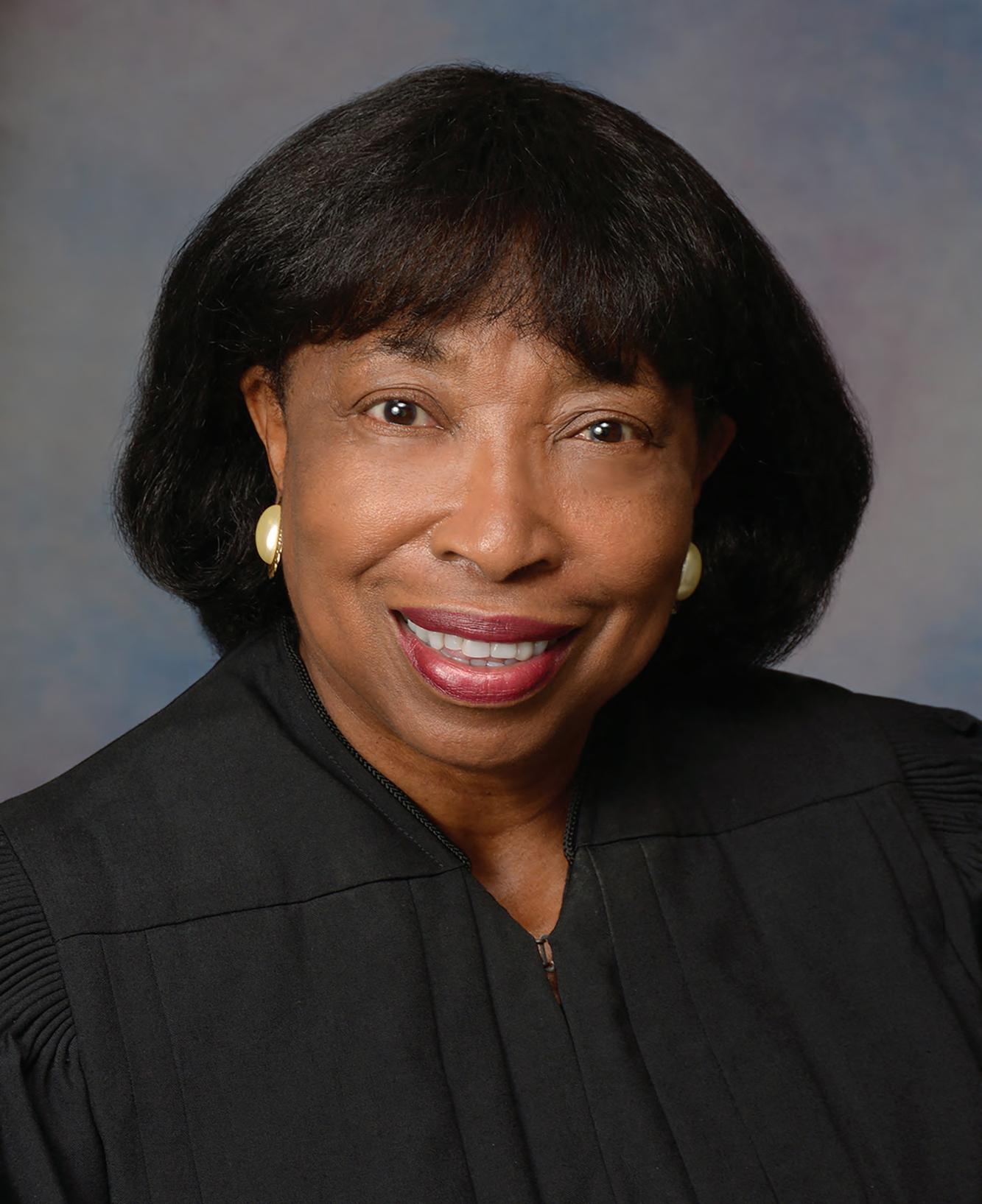
“AT THE UNIVERSITY OF MEMPHIS, YOU CAN GET A FIRST-CLASS, HIGH-QUALITY, ECONOMICALLY ACCESSIBLE EDUCATION.”

“THE UNIVERSITY OF MEMPHIS MADE A HUGE DIFFERENCE IN MY CAREER AND REALLY MADE IT POSSIBLE.”

Even though Judge Holly Kirby arrived at the University of Memphis as an undergrad to begin an engineering degree, she already knew she would go to law school and might even want to be a judge.
“I came from a family with not a lot of money, so I wasn’t sure how I was going to pay for college,” she said. “The University of Memphis solved that problem for me by giving me a generous Herff engineering scholarship.”
Kirby lived in the dorms and loved her classes. Eventually, she was awarded a Herff scholarship to law school, too.
“Engineering and the law are actually surprisingly similar,” she said. “Both are logical, analytical and you’re often dealing with situations that have a lot of factors. You have to make the best decision to solve a problem. I’ve always had a strong sense of fairness and I’m comfortable making decisions.”
Kirby has had plenty of chances to do that. After some early clerkships and a stint as a labor and employment attorney with Burch, Porter & Johnson, where she became the firm’s first female partner, she was appointed by then-Gov. Don Sundquist to the Tennessee Court
of Appeals in 1995. Kirby was the first woman to serve on that court, too. In 2014, she was appointed to the Tennessee Supreme Court and she became Chief Justice in 2023.
“The University of Memphis made a huge difference in my career,” she said, “and really made it possible. It was a good and nurturing environment for me. It opened up the horizon so I could imagine the future.
“It’s such an asset to the region. Not every community has a first-rate research university in their town.”

When Supreme Court Justice Roger Page was growing up on the family farm outside Henderson, Tennessee, he couldn’t have guessed he’d become a lawyer — or a judge.
“My parents didn’t go to college, there were no lawyers in my family,” Page said.
He would pave his own educational path, and after attending the University of Tennessee at Martin, Page went on to pharmacy school at the UT Health Science Center in Memphis where he began learning about pharmacy law.
“As soon as I started reading the cases and talking about law with the professor, I knew what I wanted to do,” he said.
Page soon ended up at the University of Memphis Cecil C. Humphreys School of Law on a full Herff scholarship and never looked back.
“Lawyers who graduate from Memphis can compete with anybody,” Page said. “My classmates were all great people, fun to be around and we had very good professors, too.”
After law school, Page clerked for then-U.S. District Court Judge Julia Gibbons and practiced law in Atlanta and Jackson, Tennessee; his family has lived in West Tennessee for at least seven generations. He began his judicial career as an elected Circuit Court Judge in 1998 and went on to a seat on the Tennessee Court of Criminal Appeals.
Page became a Tennessee Supreme Court Justice in 2016 and served as Chief Justice from 2021-2023. He will retire from the bench in August 2024.
How did going to the UofM Law School impact his career? Without it, “I wouldn’t have ended up on the Supreme Court, that’s for sure. We got a practical education, and for decades, UofM students had the highest scores on the state bar exam. We had some good students and were prepared for it with excellent curriculum and professors.”
He is excited about former Memphis Mayor Jim Strickland becoming the law school dean. “It will be good for the school,” he said.
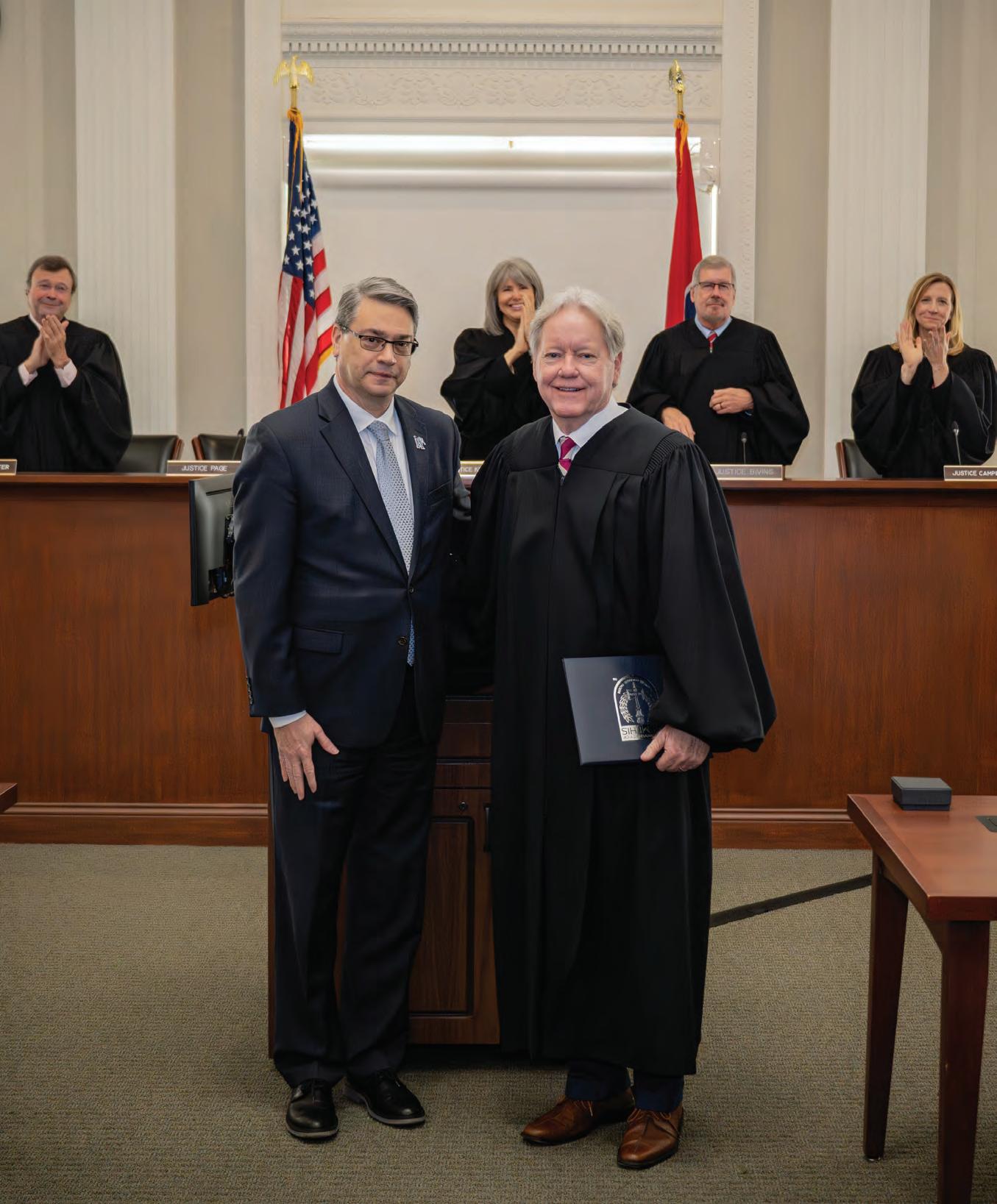
"(WITHOUT THE U of M LAW SCHOOL), I WOULDN’T HAVE ENDED UP ON THE SUPREME COURT, THAT’S FOR SURE."
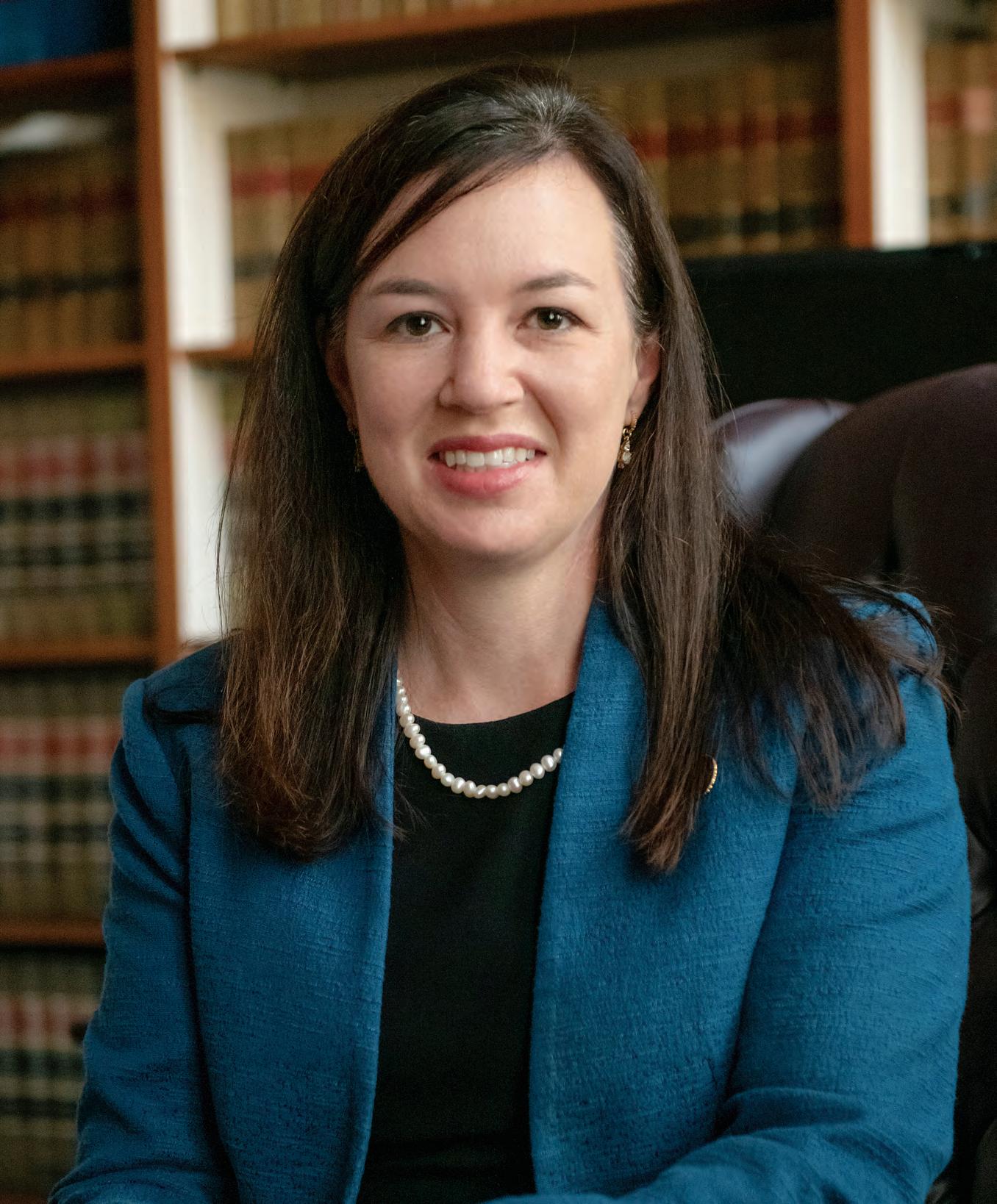
“THE UNIVERSITY OF MEMPHIS LAW SCHOOL IS A TREMENDOUS ASSET TO MEMPHIS, ESPECIALLY TO THE MEMPHIS LEGAL COMMUNITY.”

When Judge Mary Wagner decided to go to law school, she chose the University of Memphis for a combination of factors.
“It offered a practical education in the real practice of law,” Wagner said. “And the cost was very reasonable — it was a good value for the money. Also, I’m a thirdgeneration alum of the law school.”
Both of her parents and a grandfather attended the UofM.
During law school, she wasn’t sure what kind of law she wanted to practice, but she was inspired by her professors and their passion for their students.
“They wanted to teach us to be good lawyers,” Wagner said. “And I grew to love legal writing through law school. It really shaped a large part of my career.”
Wagner graduated from law school in 2009 and said the opportunity to clerk for a then-Circuit Court Judge Robert Childers opened her eyes to a judge’s work, though she eventually went into private practice doing general civil litigation at Rice, Amundsen & Caperton.
In 2016, she was appointed to a seat on the circuit court even though she hadn’t planned to be a judge prior to law school. She discovered she enjoyed the work.
“Being a judge means being an advocate for the law, which is something I enjoy, really digging for the legal answer and not advocating for one side or the other,” said Wagner, who is serving on the circuit court bench until September, when she will assume her new role as a Justice of the Tennessee Supreme Court.
“The University of Memphis Law School is a tremendous asset to Memphis, especially to the Memphis legal community. There’s opportunity for dialogue about various legal issues and an opportunity to work with students. We don’t just educate them, we learn from them.”

Congressman David Kustoff grew up loving the University of Memphis, and never really thought of going anywhere else after he graduated from White Station High School in 1985.
“The University of Memphis offered me a full scholarship,” he said. “It just felt right.”
As an undergrad, he credits Dr. Don Carson, then Vice President for Student Affairs, with helping him learn to be a leader on campus and develop relationships that are still important to him.
“Dr. Carson said to us, ‘You people have leadership scholarships; I want you to lead, somehow.’”
Kustoff said Dr. Carson helped him get to know Jim Strickland, then president of the Student Government Association and later Kustoff’s law partner (and Mayor of Memphis), Tre Hargett, now Tennessee’s Secretary of State, and Deke Sundquist, the late governor’s son.
Kustoff got involved in restarting the Alpha Tau Omega fraternity on campus, where he became president; he also led the campus Student Activities Council.
When the time came to think about law school, staying in Memphis was a “no-brainer.”
“I wouldn’t trade my time at the University of Memphis for the world,” he said.
“It helped me grow into a better person and, hopefully, a stronger leader.”
As a member of Congress who serves a district that includes parts of 20 counties in West Tennessee, he points with pride to the University of Memphis Lambuth campus in Jackson. “I give Dr. [Shirley] Raines a great deal of credit for being strategic and working with Gov. Haslam to make the Lambuth campus happen,” he said.
“I hesitate to think what our community would be like if we didn’t have the University of Memphis and all the people it graduates and all the opportunities it offers,” he said.
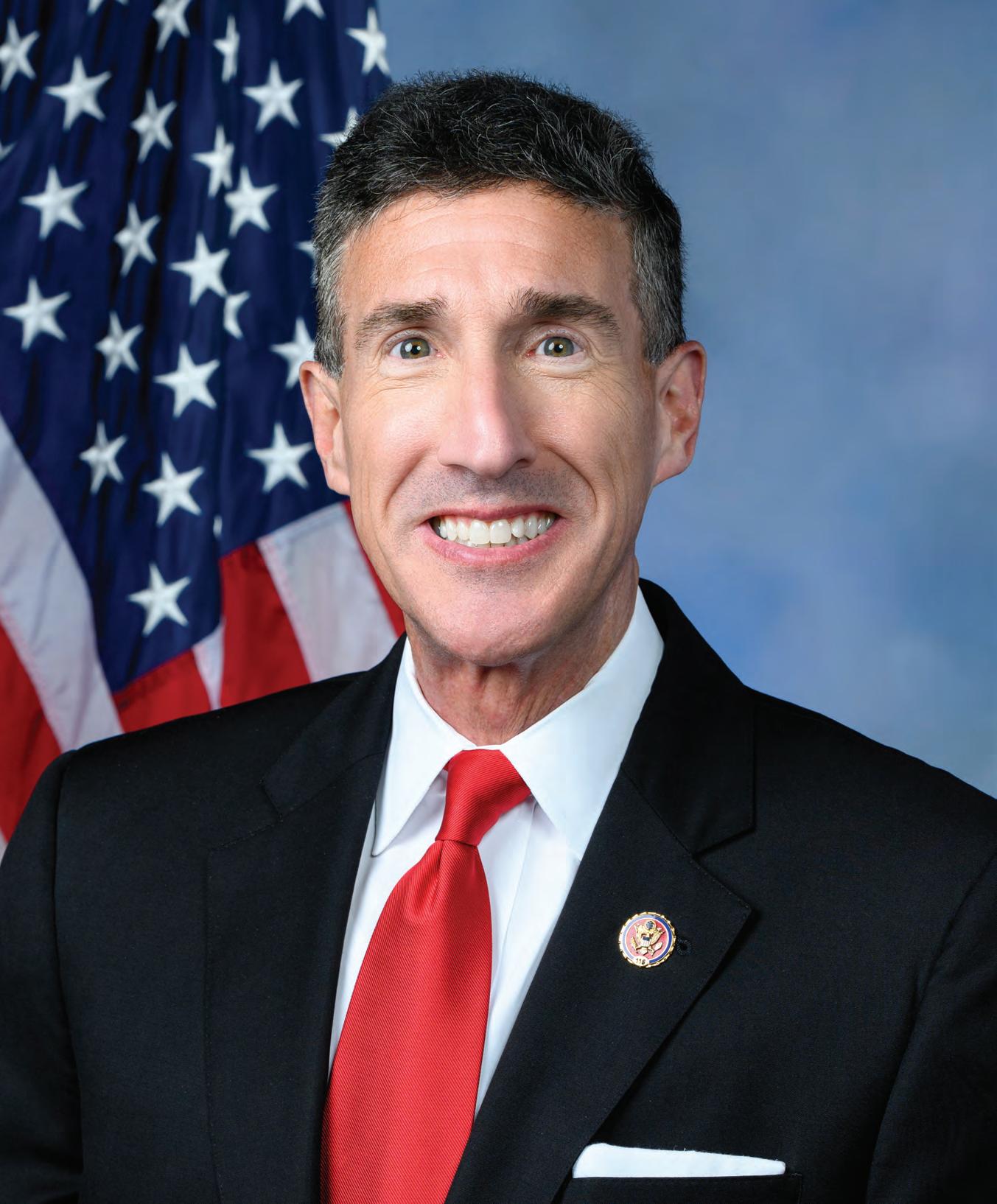
“I WOULDN’T TRADE MY TIME AT THE UNIVERSITY OF MEMPHIS FOR THE WORLD. IT HELPED ME GROW INTO A BETTER PERSON AND HOPEFULLY, A STRONGER LEADER.”
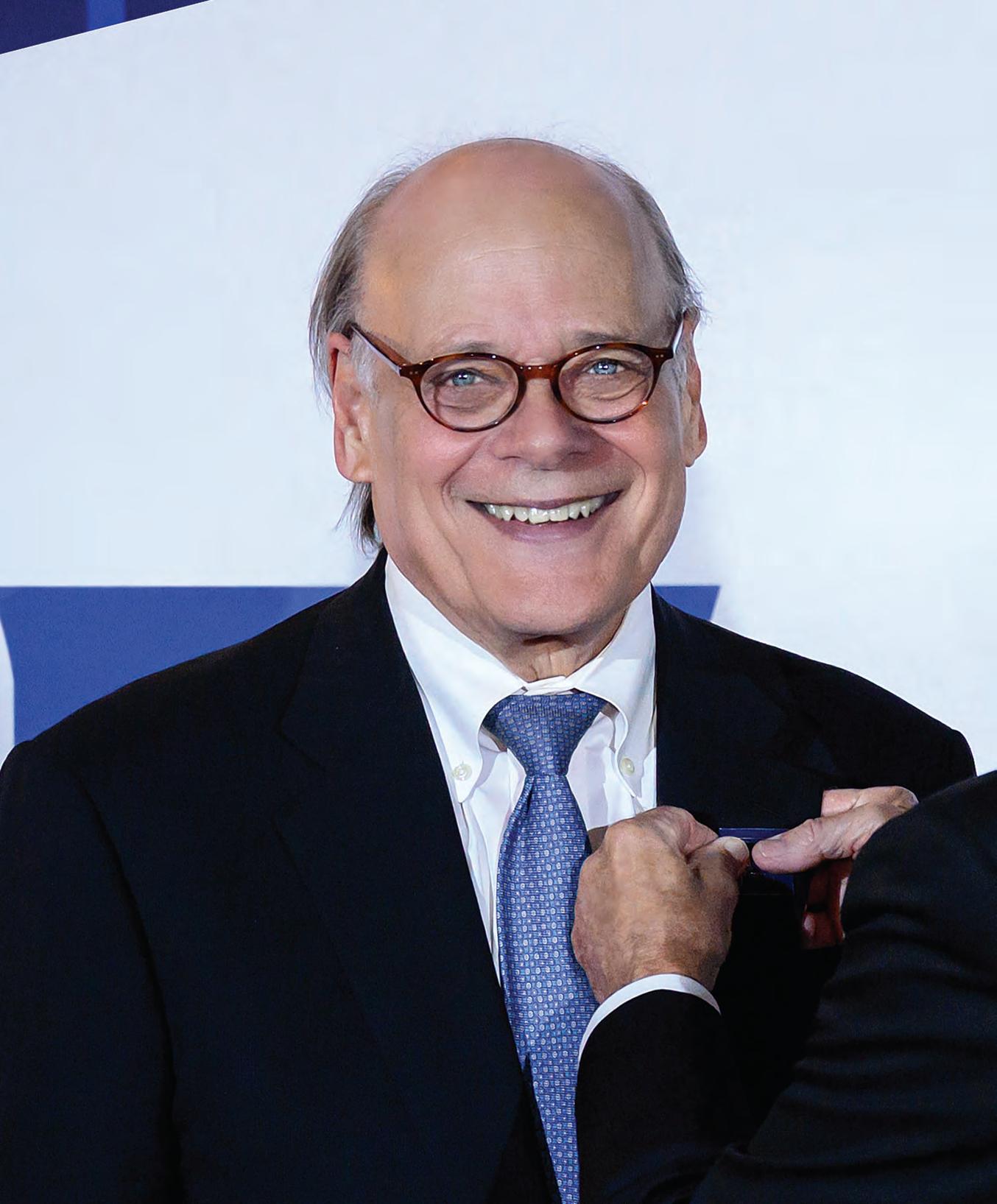
“NOW THE R1 RESEARCH DESIGNATION IS SIGNIFICANT; THAT’S THE WAY UNIVERSITIES STAY ALIVE. I’M A HUGE SPORTS FAN, BUT RESEARCH AND ACADEMICS ARE WHERE THE UNIVERSITY NEEDS TO STAND.”

There was never a doubt in Steve Cohen’s mind that he wanted to serve as an elected official — he first ran for the Tennessee State Legislature as a junior at Vanderbilt University in 1970.
Coming back to Memphis to go to law school seemed obvious.
“I thought it would be a good way for me to get into politics,” he said.
He was correct. Cohen served as a Shelby County Commissioner, in the Tennessee State Senate for 24 years and was elected U.S. Congress to represent Tennessee’s 9th District in 2006, where he has served ever since.
“I made a lot of good friends and had a lot of good professors at law school,” he said. “It was a large class, and I still have a set of friends who communicate regularly. We have our big 50th reunion this year.”
He was recognized as a Pillar of Excellence by the UofM Law School last summer, and calls it “one of the best honors I’ve ever had.”
Beyond his own experience, though, Cohen is clear about the enormous value of the University to the city.
“It’s important to educate the students who become the workforce that keeps the city moving,” he said.
He has closely watched as the University has reached significant milestones and said it’s important to keep it going in the right direction.
“When I was a kid, it became Memphis State and then the University of Memphis during the 90s, which I think gave the school a higher patina,” he said. “Separating from the Board of Regents and having their own board kept the name appreciating over the years. Now, the R1 research designation is significant; that’s the way universities stay alive. I’m a huge sports fan, but research and academics are where the University needs to stand.”

Angie Craig, now a congresswoman from Minnesota, arrived on campus at the University of Memphis with her mind set on becoming a journalist.
“My first memory is walking into Professor Elinor Grusin’s office and telling her I wanted to be a reporter on the Daily Helmsman,” she said. She eventually became the paper’s top editor, and loved it.
“(Tennessee Secretary of State)
Tre Hargett was president of the student body when I was editor of the Helmsman,” Craig said. “I always thought I was going to chase down politicians and hold them accountable, not be one!”
Craig and Grusin, now retired, are still in touch.
“I have very few memories of college, but I do remember putting the paper to bed in the basement of the Meeman Journalism building.”
Craig later became a reporter at The Commercial Appeal.
“I was mostly a general assignment reporter at both the Daily Helmsman and The CA,” she said, and points out that her job in Congress is similar. “Like in journalism, you’ve got to know a little bit about a lot of things. Truthfully, the job I still enjoy most is sitting down with constituents and hearing their stories.”
Craig doesn’t get back to campus often, but hosted President Bill Hardgrave last year in her office in Washington and came away impressed by the research capabilities the University has built.
“I’ve always thought of the University of Memphis as a little bit of an underdog, punching above its weight,” Craig said.
“I’ve always thought of myself as a little bit of an underdog, too,” she said, having grown up in an Arkansas mobile home park, raised by a single mother.
“I loved my time in Memphis, and I’m always rooting for Memphis.”
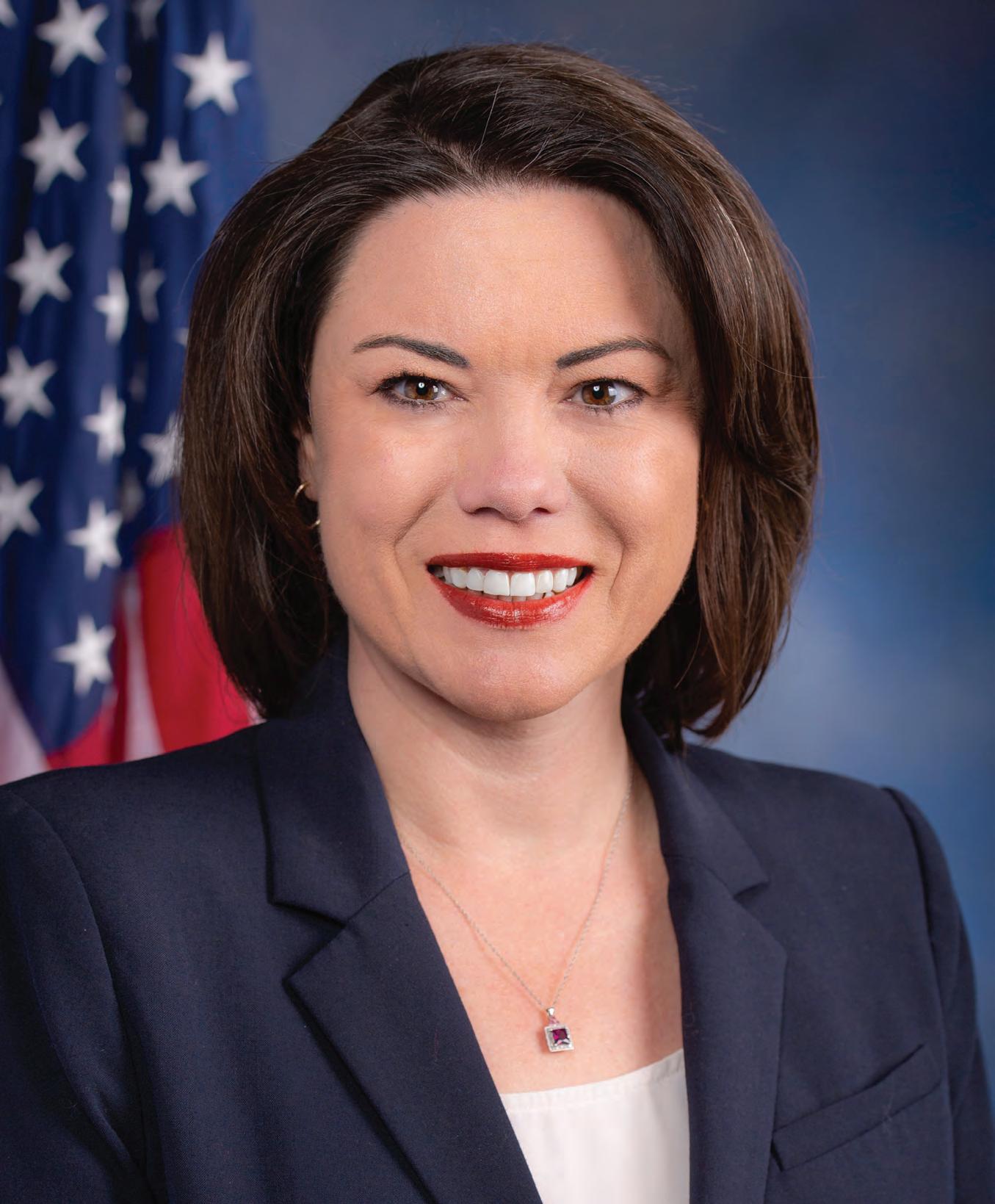
“I LOVED MY TIME IN MEMPHIS, AND I’M ALWAYS ROOTING FOR MEMPHIS.”

hough he grew up in Nashville, Andre Dean had developed an affinity for Memphis long before the Memphis State recruiter showed up at McGavock High School.
“The University was known for having a good accounting and business program, and it also had one of the largest populations of minority students for a predominantly white school — diversity was important to me,” Dean said. “It just clicked. I was from inner city Nashville and had some scholarships, and I was an athlete. Most people wanted me to play sports, but I was for the books.”
It was a perfect fit and a great experience.
“My first year I got involved in the Black Student Association and pledged a fraternity, and I met people from everywhere,” Dean said. “I was always involved in politics and activism.”
Those relationships and that activism positioned Dean for everything that came later, he said, including opening his own public affairs and community development consulting firm, Dean and Associates, eight years ago.
“We do more than lobbying, depending on what the requirements are,” Dean said. “I am always interacting with community and government and business leaders — there’s one degree of separation there. We’ve been involved in a bunch of different issues.”
Dean mentions his involvement in the development of the old Memphis Fairgrounds into Liberty Park as an example of his interconnected business life.
“We help business speak government and help government speak business,” Dean said. “We’ve been successful at being a niche firm that helps get things done for people.”
Before he opened his consulting firm, Dean worked for the Greater Memphis Chamber of Commerce as a Vice President, first of Public Policy and Community Affairs, then of Community Development. Before then, he worked in the transportation industry, particularly with Laidlaw Education Services, the school bus vendor for Memphis-Shelby County Schools.
Everywhere, he is able to rely on his ties to the University of Memphis.
“It’s crazy … I’m working with people I’ve known for years,” Dean said. “In Memphis, you’re going to do business with people from the University of Memphis.”
He’s long been in politics, too.
“It’s just second nature,” Dean said. “I was in school with Jim Strickland and David Kustoff; I was an early supporter of Steve Cohen. I was part of the original group of young guys who pushed Dr. Herenton to run for mayor. I met Paul Young’s parents before I met him, but he was an outstanding young man. I commend people who serve — it’s major work.”
He's still connected to the University through his friends and Tiger sports, though he’s also proud of the Memphis pipeline he’s developed in his own family.
“One of the things I’m most proud of is that I was the first in my family to go to college,” Dean said. “After me, my twin sister’s oldest son came to Memphis for his undergrad and masters, followed by his brother, another nephew, a great-niece and her siblings.”
Dean can’t imagine being anywhere else. “This is a rich place to be. I’m excited to have graduated from Memphis.”
hough Sheleah Harris works in government and community affairs now — she’s the Corporate Affairs Manager for the 93-store Kroger Delta Division — when she was an undergraduate at the University of Memphis, she admits she didn’t know that lobbying, advocacy or community engagement was actually a profession.
“I’ve always been an advocate,” Harris said, “especially for those who felt they didn’t have a voice. But I didn’t know there was a space where I could do just that.”
The University of Memphis and the connections she made there started her advocacy journey.
“I was able to get an Emerging Leaders scholarship, which is how I met Dean [Justin] Lawhead, and he and I are still connected,” Harris said of the current UofM Dean of Students. She started out studying architecture but wound up with majors in marketing and fashion merchandising. “I enjoyed connecting with people and being able to promote something always gave me a lot of excitement.”
She grew up between Cordova and Bartlett in a family of educators, though she never wanted a career in education. Still, she taught a high school marketing class and ended up “in love with education, being around my students with their different backgrounds. I fell in love with advocacy as I was advocating for my students. That’s when the world of lobbying opened up to me.”
When she saw the impact she could have as a lobbyist, she began to feel as though she’d found her calling.
“When I first became a lobbyist, I didn’t know what it was,” Harris said. “I was advocating for kids who were unhoused, then for education — with charter schools,
homeless youth and at the state and local level for children in general. I registered as a lobbyist for the first time.”
She transitioned from education to telecom, working for Verizon on digital access and equity. Her current job at Kroger encompasses all of her previous experience, with an emphasis on community engagement, communications and managing relationships with local and state officials across the Kroger Delta Region.
“What I like most is the opportunity to engage with people with diverse backgrounds and viewpoints, and build new relationships,” Harris said. “I learned how to do that at the UofM. It was really just survival — I stayed at Richardson Towers and dorm life teaches you how to be around diverse people and navigate life as a young adult.”
She is also grateful for the connections she made with UofM faculty and staff, “who really do care about students in the longer term, not just for the few years they’re on campus. Dr. Lawhead is the biggest champion I’ve ever had in academics, period, and is a great support and thought partner.”
Harris said she bleeds Kroger and Tiger blue, and is happy to be involved in giving back to the school in various ways. She points especially to Kroger’s support of the on-campus food pantry for students.
“I had no idea that 40% of college students are food insecure,” she said. “Being in a position to do something about that, at my home school, was a full-circle moment.
“I have a lot of pride in being an alumna of the University of Memphis.”

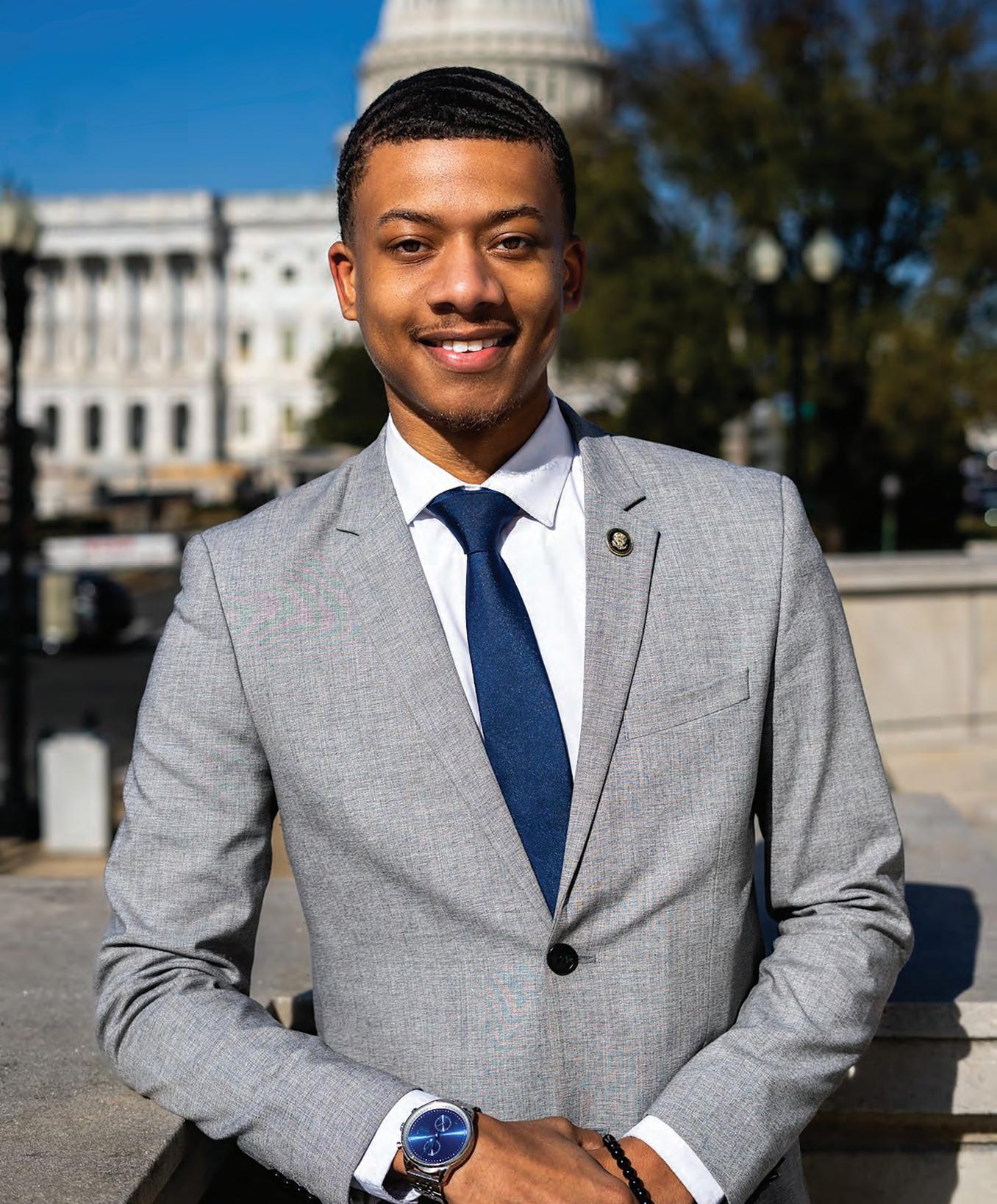
hen Kyler Gilkey graduated from the Soulsville Charter School in South Memphis, he knew the music he had learned there would always be a passion, but it was politics that called him to a career. He found the beginning of that career path at the University of Memphis. His family has deep ties to both worlds.
“My dad is a musician, the Bar-Kays are uncles and Kirk Whalum was a mentor – I grew up in that sphere,” Gilkey said. “But my family has also always been politically involved and active. I met Congressman Steve Cohen when he was a state senator and I was a small boy. That’s why working for him later on as a full-time staffer was a full-circle moment for me.”
Gilkey has now worked as a staffer for two members of Congress after only three years in Washington. He started as an intern in Memphis for Congressman Cohen, then moved to Washington to take a job in Cohen’s office as a staff assistant. He now works for California Congresswoman Sydney Kamlager-Dove as her legislative assistant.
Gilkey knew he was interested in political science from the beginning at the UofM.
“I spent a lot of time in the Soulsville area and lived near Southwind,” Gilkey said. “I saw how the communities I was living in were left out of opportunities and I wanted to be in a position to say who gets what and when, where and how.”
He learned that definition of politics from one of his first UofM political science professors.
Even though he’s a third-generation Tiger, “I went to the University of Memphis mostly for economic reasons; it was the best option for me then,” he said. “And I had some amazing professors — Professor (David) Madlock, Professor (Ebony) Dawkins and so many other people.
“It really made a difference having African-American professors who were lawyers and political science professionals. They made me feel like that was something I could do as well. Representation meant a lot to me.
“Too often, Black and brown people don’t have a seat at the table. I knew that I wanted to do something about that, I wanted to work my way up to have a seat at the table. I want to be part of the decision-making. That’s why I’m in this.”
Gilkey also majored in criminal justice, which helped him “see the politics of things, but also how the system works. Professor (Bill) Gibbons was one of my professors, and I learned a lot from him.”
Though one of Gilkey’s younger brothers graduated from UofM last year, he hasn’t been back to campus officially since he graduated. Still, he feels “100% invested in Memphis,” both the city and the University.
“I’m a Tiger through and through.”
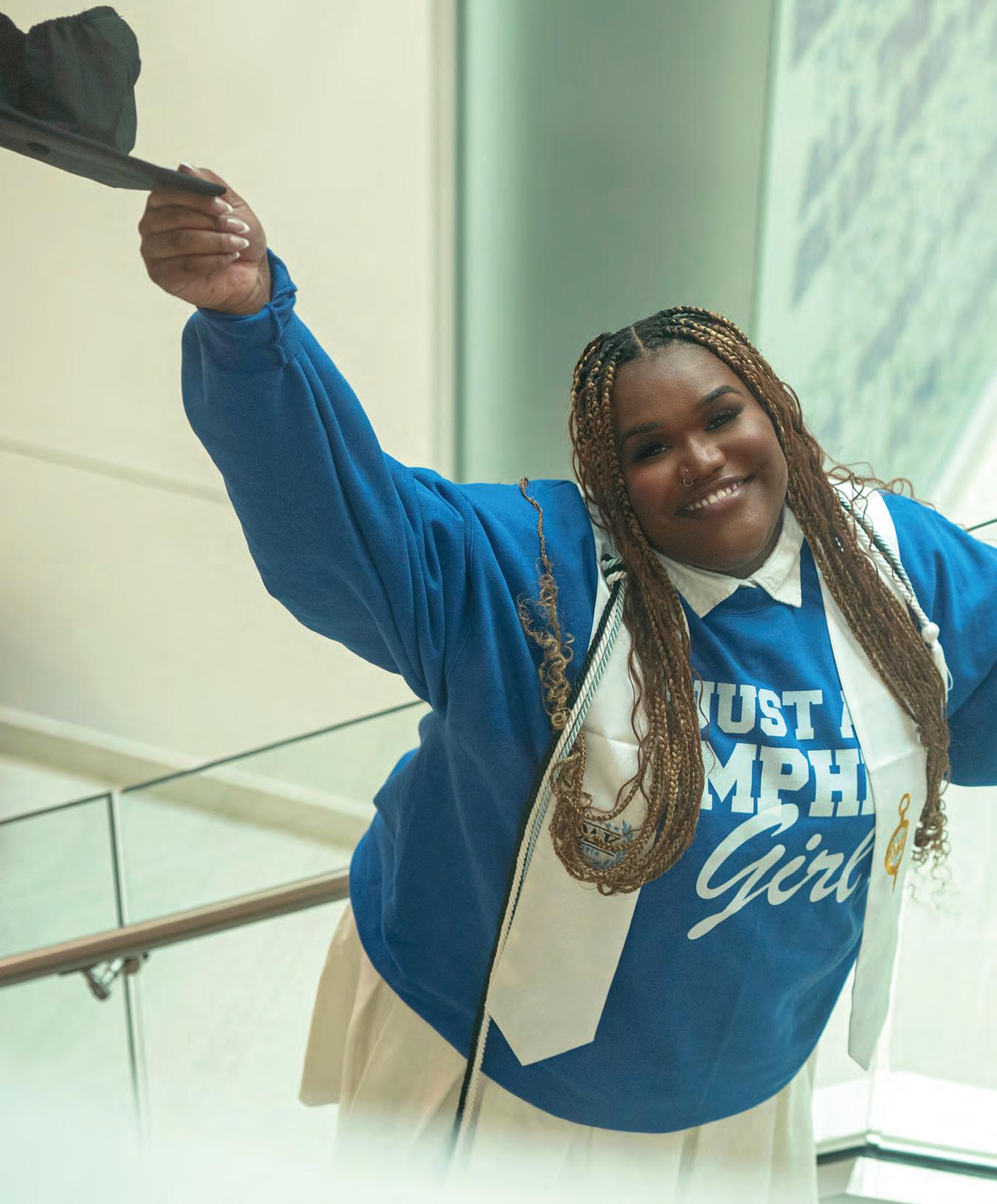
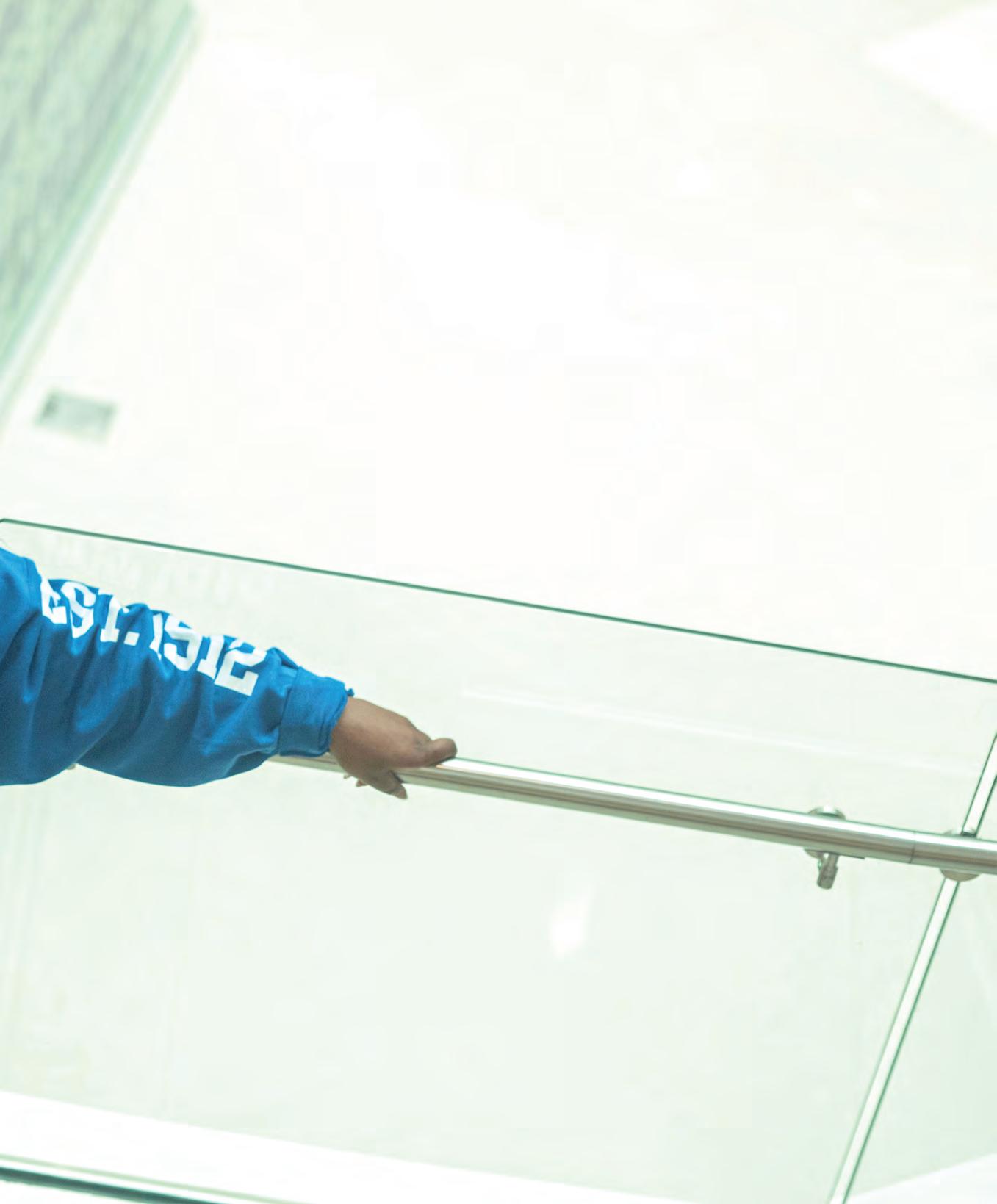
During her time as a student, LaNerra Gray was involved with the Student Government Association, Tigers for St. Jude and Black Scholars Unlimited. A Memphis native, Gray served as the president of Student Tennessee Education Association, a College of Education ambassador and on the Student Ambassador Board. After earning her degree in May 2024, she is beginning her career as a functional skills teacher.
“My experience at the UofM showed me how meeting a stranger can truly impact your world. There are so many people I’ve met that have made my college experience what it has been — exciting, impactful, fun and loved.”
 BY OMAR SOMMEREYNS
BY OMAR SOMMEREYNS
When Dr. Ashish Joshi became dean of the School of Public Health at the University of Memphis in the summer of 2022, he wanted to act fast with an educational approach that would go beyond academia.
Given the many distressing statistics throughout the current public health spectrum, Joshi understood this was a necessity. For example, according to a National Center for Health Statistics survey, 47.3% of the U.S. population reported having been diagnosed with high blood pressure.
The state of public health must also be measured by greater, overarching factors that are inherently debilitating, such as poverty levels in any given area. Poverty can severely affect access to proper nutrition and generally healthy standards of living. In Memphis, the overall poverty rate is 21.4% and the child poverty rate is 32.7%, both among the highest in the country.
“We’re facing rapidly changing socioeconomic and geopolitical environments that demand a new way of thinking about public health within a local, national and global context,” Joshi said. “Public health education shouldn't just be about research and garnering knowledge. We need to translate those programs into impactful solutions versus just publishing papers and books. We need practical solutions in order to instill a greater community impact.”
How does that actually work? For Joshi, it begins with giving the youth the knowledge and tools necessary to address public health challenges.
“Investing in youth health and well-being is essential to economic growth and social change,” he said. “We want to enhance the understanding of the field of public health early on and help young people see how they can choose a career in public health without having to necessarily become a physician or a nurse.”
Pragmatically, Joshi sees the youth as important drivers of public health who can bring back what they learn to their families and communities to help galvanize change, allowing their educational pursuit to go beyond academia.
“They are the biggest contributors to public growth,” he said. “Think about it this way — If the youth are dealing with obesity, substance abuse, alcohol, smoking, mental health issues or even motorcycle accidents, those are early triggers that can inhibit their growth and the positive growth of the general public. They can delve into this before becoming undergrads since it's all surrounding them already.
One major step forward at the UofM School of Public Health is its dualenrollment program, which expedites high school students into the realm of public health by allowing them to take college courses. The program can open doors into various careers in healthcare, government, non-profits and more. Credits earned can be transferred toward a bachelor’s degree if students choose to attend the School of Public Health.
“We're building a model for public health education in high schools with a multi-pronged system. There's dual enrollment, there are public health clubs and then there are hackathons to challenge the youth to come up with big, bold ideas on how to solve the emerging challenges of public health.”
Joshi perceives the prioritizing of the public health problems in Memphis as a duty of the School of Public Health.
The aim is to go beyond University walls, as the School is extending itself to actively collaborate with other organizations — including the health department, veteran affairs, fire department, local schools and juvenile court system — in addition to hospitals.
Given that Memphis has some of the worst socio-economic disparities and social determinants of health in the nation, a forward-thinking public health program can have a big impact on the local community and, potentially, set an example for other programs around the globe.
“We're living in an interconnected world with similar problems and potentially similar solutions,” Joshi said. “Yes, the underlying factors and causes may be different in Memphis and, say, Nigeria; but the public health issues of income, housing, poverty and the environment can be universal. So, we can think about glocalization here, which is a concept that goes from global to local and vice versa, and we can help the youth gather inspiration from how other countries are addressing public health problems and apply that locally.
“It's not just about creating a workforce or doling out degrees. We have a much larger responsibility as public-health educators. We need to be more creative, dynamic and entrepreneurial. In an aging society, we need a new community of learners to re-envision, revolutionize and eventually lead the field of public health.”
To learn more, visit memphis.edu/publichealth .
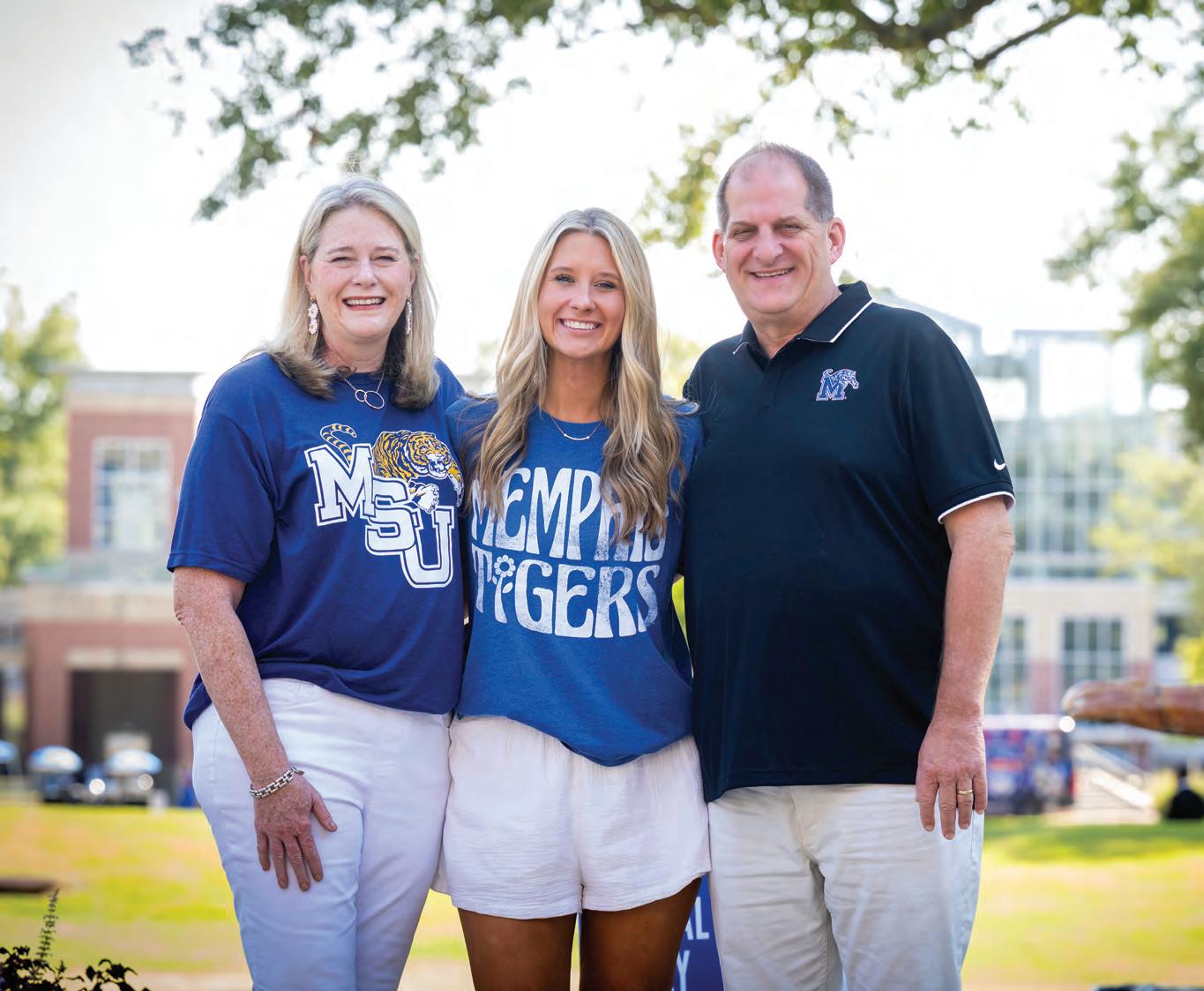
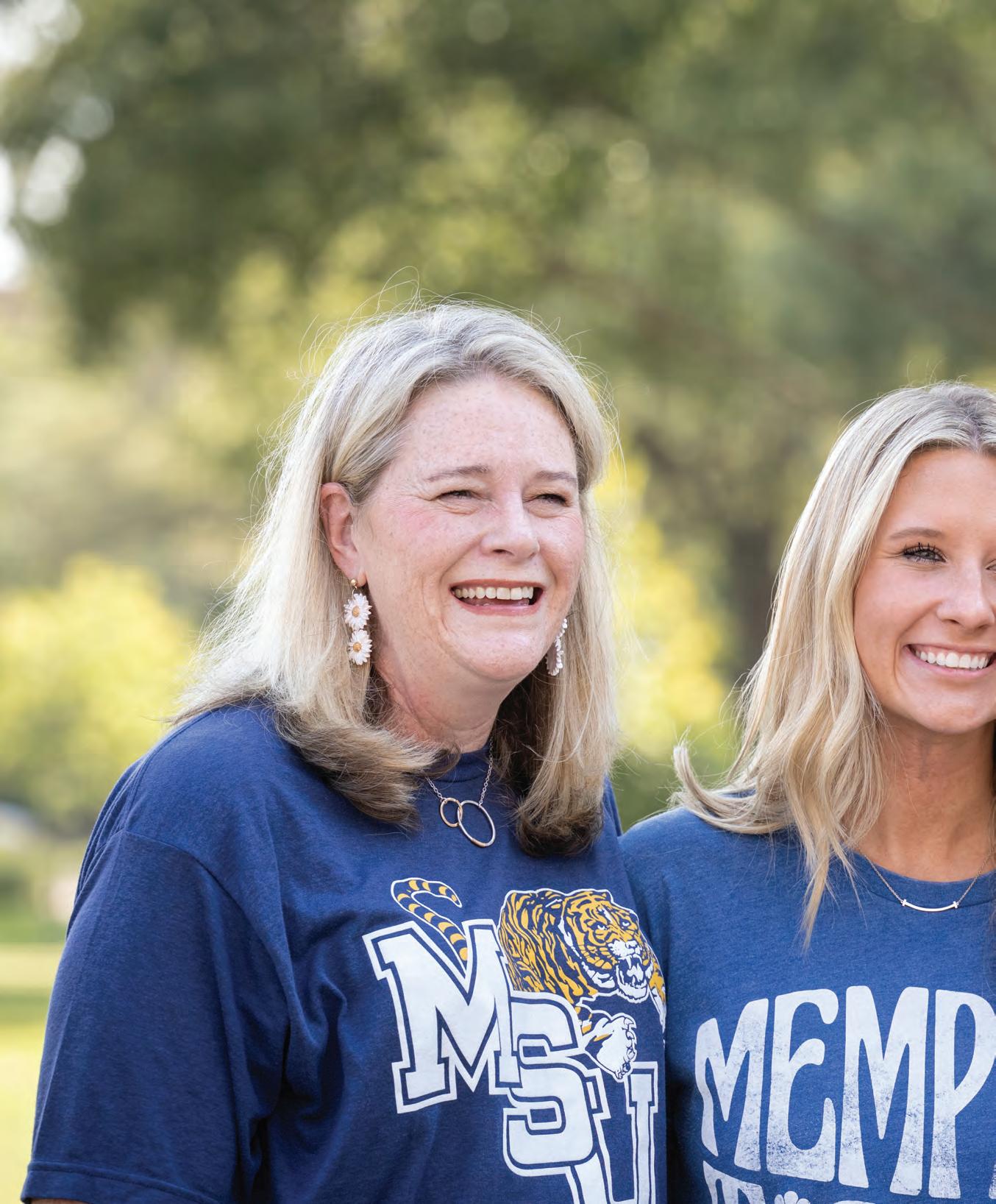
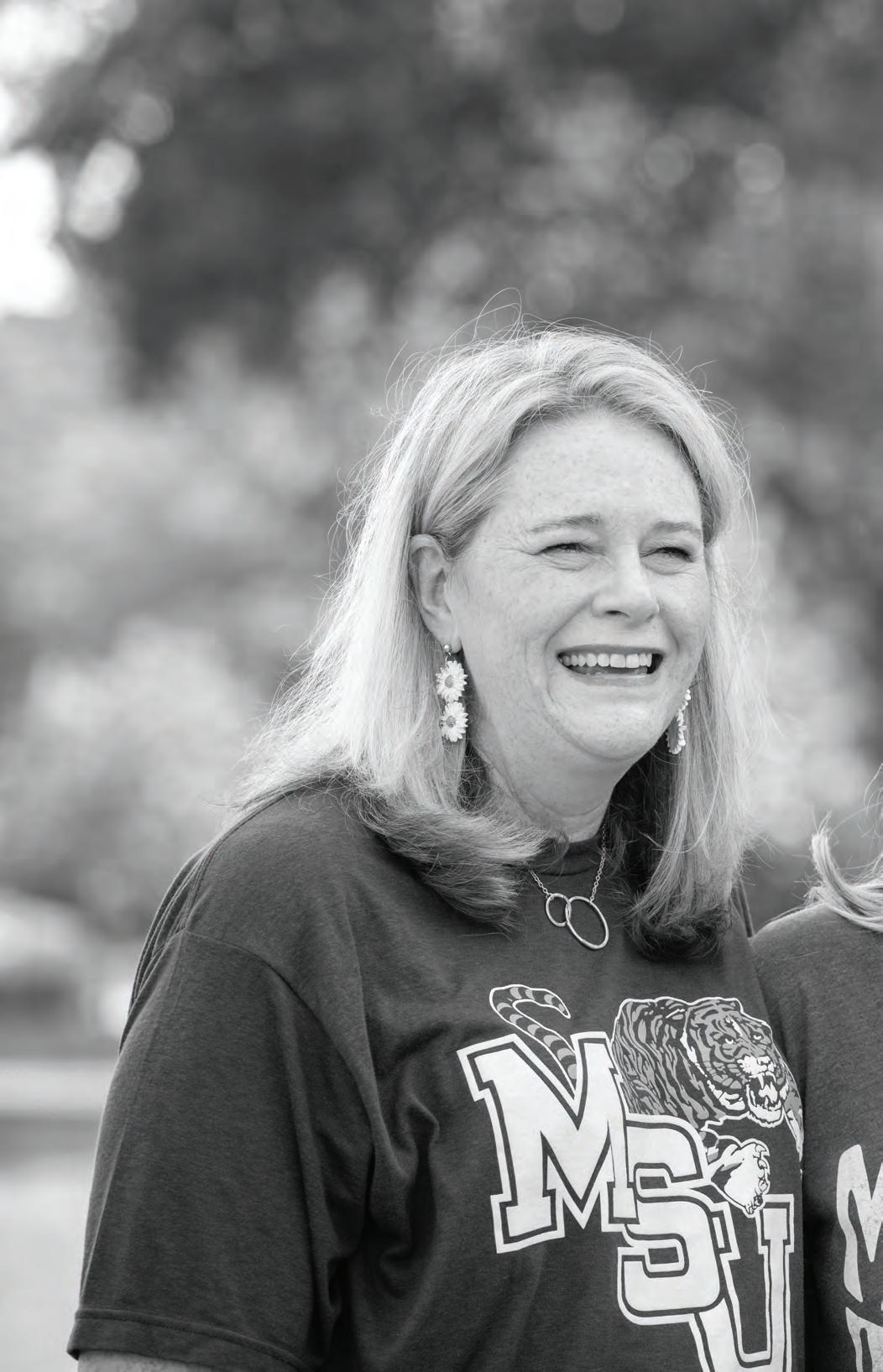
 By Heather Hampton
By Heather Hampton
The day their daughter Ashleigh told them she had decided to attend the University of Memphis, Greg and Sharon Corley were overjoyed. Sharon, a UofM graduate, grew up in Dyersburg, Tennessee, and knew she wanted to go to college in a bigger city that wasn’t too far from home.
“My mother always took my sister and me to Memphis to shop and eat and I loved the city vibe,” Sharon said. “I believed Memphis would have more opportunities for a career after college, but I only knew one other friend attending the University when I started, so it was quite a leap of faith for me.”
Reminiscing about her time at the UofM, Sharon immediately began planning for Ashleigh’s dorm room — checking out organizations for her to join, finding tailgate locations and everything else an excited alumni parent would do. After all, the Collierville residents would only be about 30 minutes away from their daughter and the campus they’d grown to love.
Complications from Greg’s treatment led to several weeks in the hospital as they searched for solutions and next steps. Instead of letting it break them, the Corleys became stronger together, allowing their love for each other to help them persevere through a difficult time.
Leaning into the friendships she established at the UofM for a source of support, Ashleigh was able to reorganize her free time to help her parents while continuing to stay focused on her courses.
“We didn't allow it to steal our spirit and joy,” Ashleigh said. “We learned how to make the most of life. Nothing stopped my parents from showing up for anything UofM-related, not even a cancer diagnosis.
“My parents not only showed me how to keep my spirits high during tough times, but they also instilled in me that showing kindness to others can go a long way.”
Ashleigh was grateful to see such a joyful spark in her parents and found comfort in knowing that they would be able to watch her flourish at the UofM. During her freshman year, Greg and Sharon came to every event they could attend. From Parent and Family Weekend to sorority and sporting events, they were always there with the biggest smiles and enthusiastic school spirit.
One cherished tradition they initiated was meeting on Tiger Lane before each home football game for the team’s Tiger Walk into the stadium. This simple bonding experience for Sharon and Ashleigh has helped cement their shared love for the University.
Beyond the festivities, having her family close was crucial for Ashleigh during the inevitable challenges of college life, which would arise sooner than expected. In the fall of 2022, Greg was diagnosed with a rare form of liver cancer.
“When the oncologist delivered the news of the substantial amount of tumors on my liver and mesentery, we were in disbelief,” Greg said.
The devastating diagnosis changed the family’s way of living. The months ahead were tough.
“My parents not only showed me how to keep my spirits high during tough times, but they also instilled in me that showing kindness to others can go a long way.”
That kindness was evident in a UofM Parent and Family Association e-newsletter spotlight in which Greg and Sharon readily shared helpful advice to other parents and families: “Enjoy the ride! Take full advantage of all that Memphis and the UofM have to offer for families to make memories because the time passes quickly.”
As the 2023 UofM Family of the Year, the Corleys were honored throughout Parent and Family Weekend in the fall, including an on-field spotlight at the Tiger football game against Boise State.
“This experience was so humbling,” Sharon said. “We were recognized for doing what we have fun doing. We were excited to go out on the field and see our kid’s friends cheering us on.”
Although there is no cure for Greg’s cancer, his treatment regimen is going well and the family remains steadfast, exploring available trials and options to prolong his life. The Corleys’ continued involvement as Tiger parents is a testimony of their determination, resilience and unwavering loyalty and passion for the city and the University that they love.
“I truly feel like the luckiest daughter by having parents who choose to spread joy to others no matter the circumstance in life,” Ashleigh said.
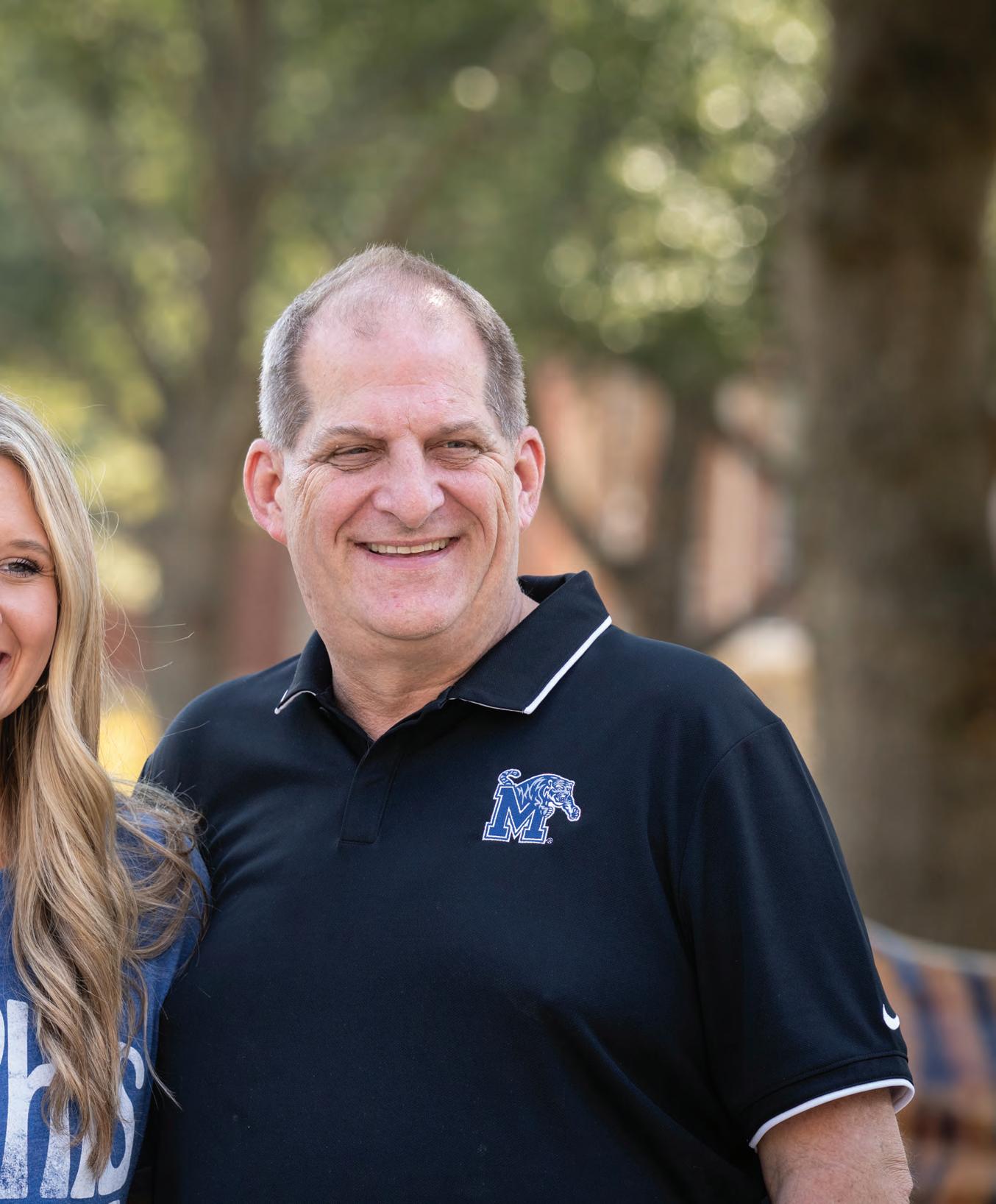
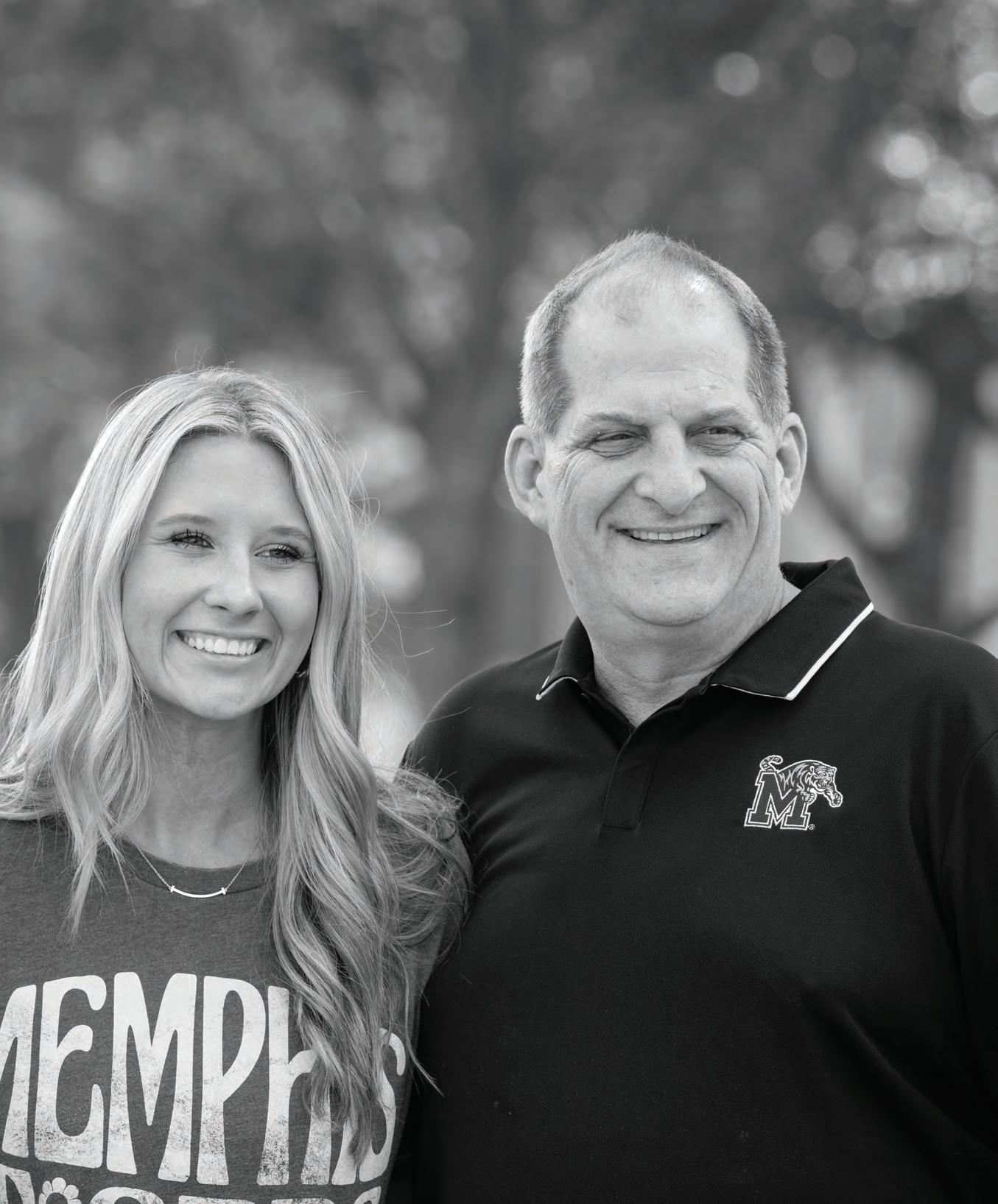
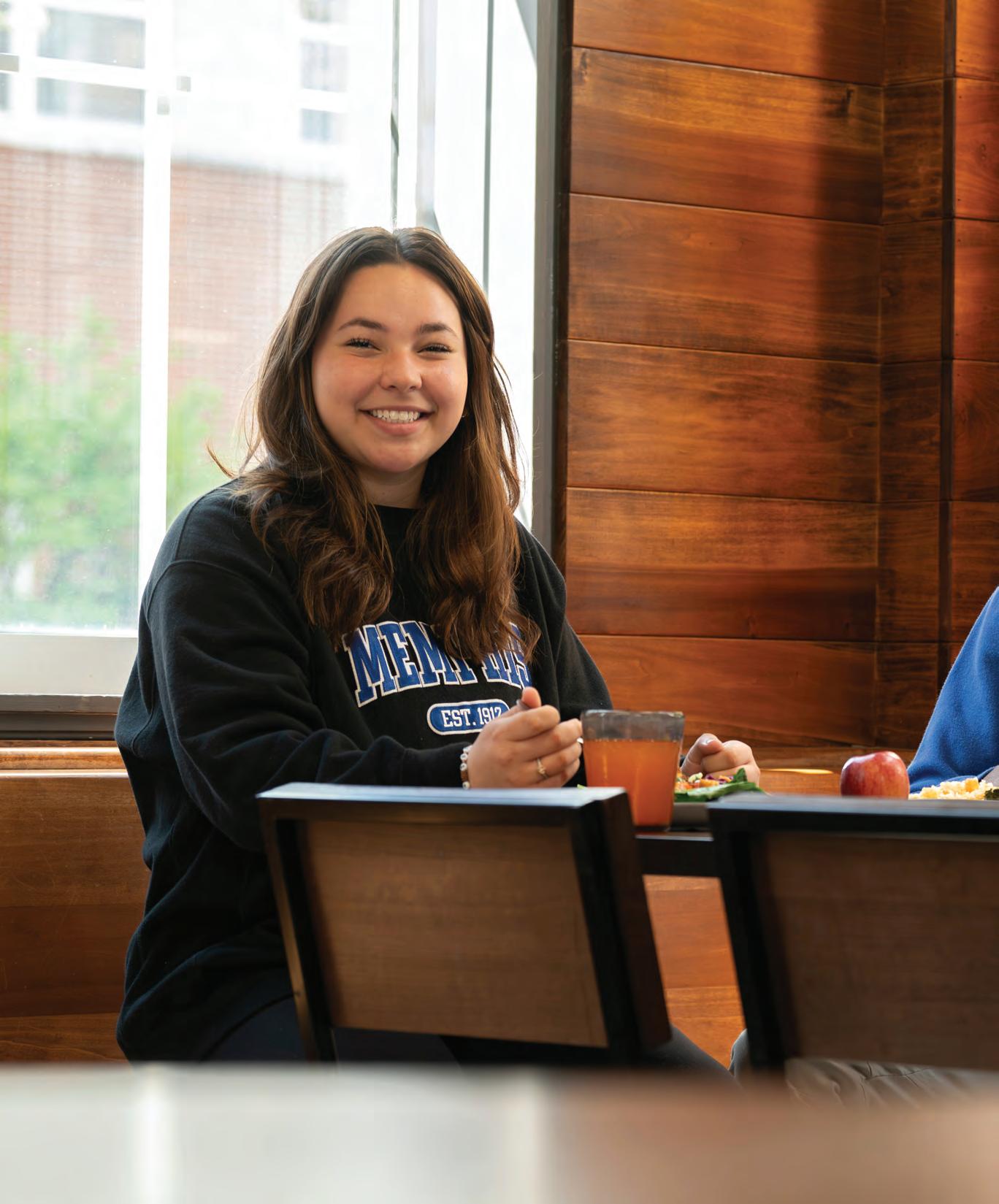

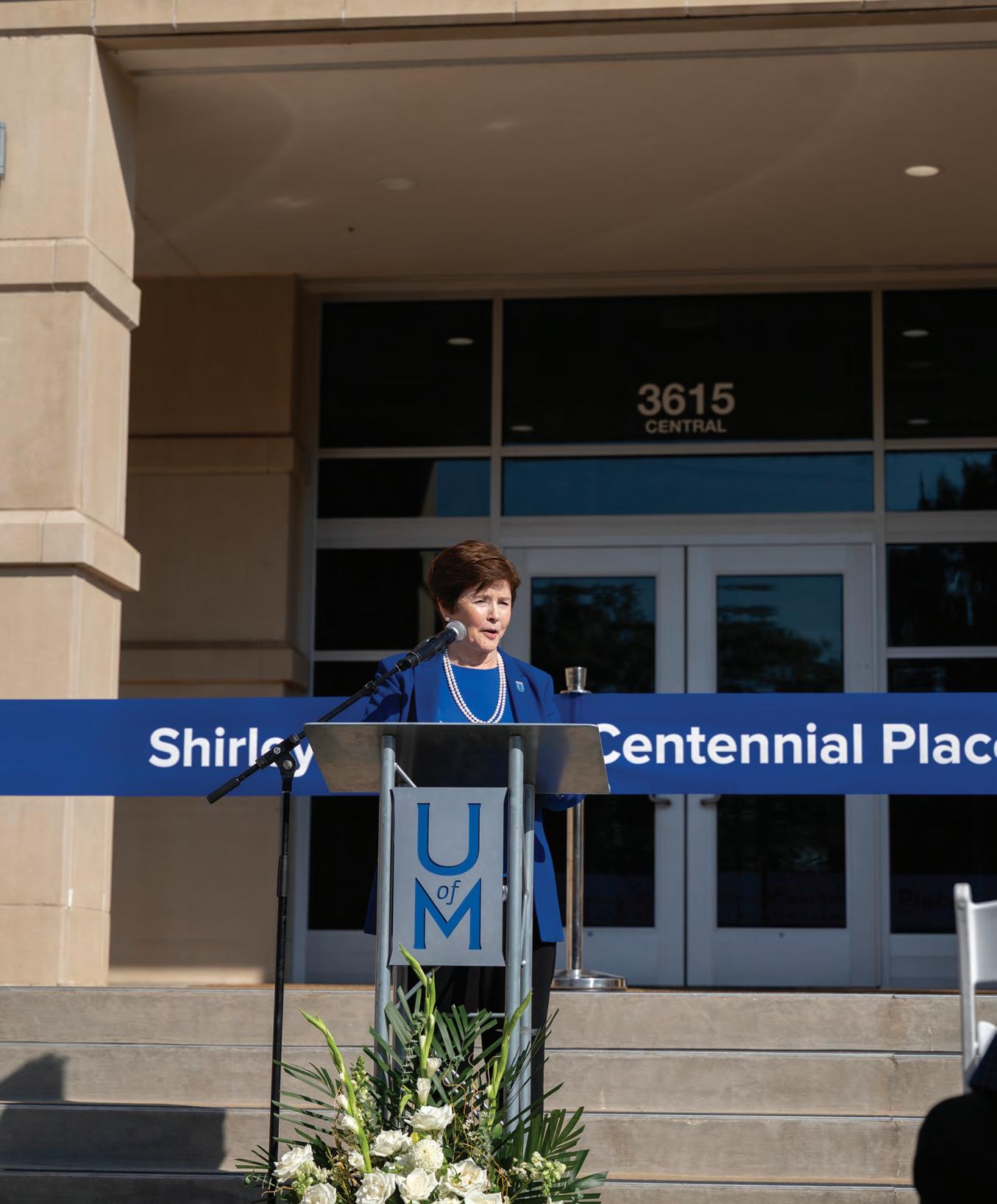
OCT. 19: Shirley C. Raines
Centennial Place
Former UofM President Shirley C. Raines speaks during the ribbon-cutting ceremony for the renaming of Centennial Place residence hall in her honor.
16:
UofM men’s soccer midfielder Eric Primo celebrates after the Tigers defeated SIUE, 2-1, to earn the program’s firstever victory in the NCAA Tournament.


NOV. 17: Sweet,
UofM women’s soccer midfielder Finley Lavin celebrates after scoring in the six-seeded Tigers’ 3-2 victory over third-seeded Notre Dame in the second round of the NCAA Tournament. The win qualified the Tigers for the Sweet 16 for a second consecutive season.
The UofM football team celebrates in the locker room after defeating Iowa State, 36-26, in the AutoZone Liberty Bowl to complete a 10-win season.

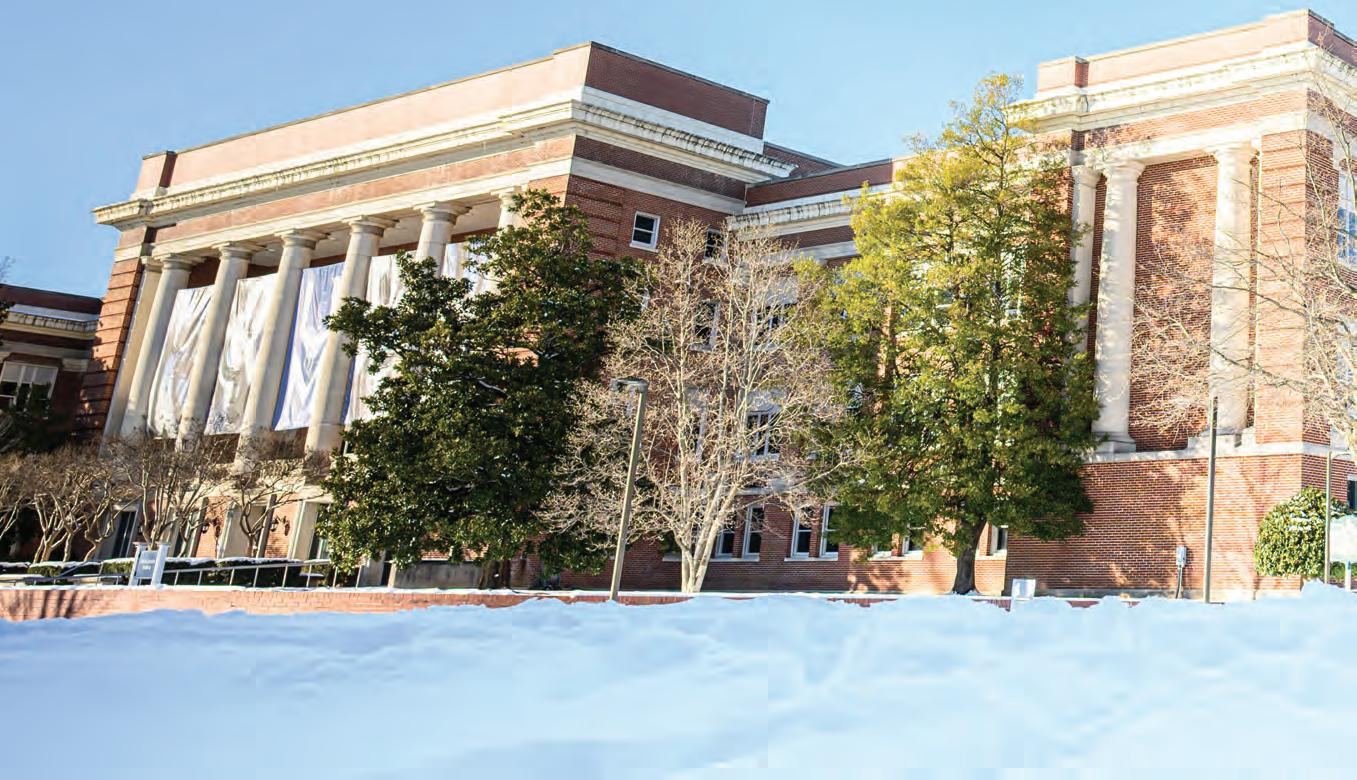
Students enjoy a snow day on the UofM campus.
UofM men’s tennis doubles pair Pablo Alemany (front) and Charlie Barry celebrate after defeating No. 5 Cooper Williams and Daniel Milavsky of Harvard. The win helped the Tigers beat No. 11 Harvard, 4-2, at the Leftwich Tennis Center.


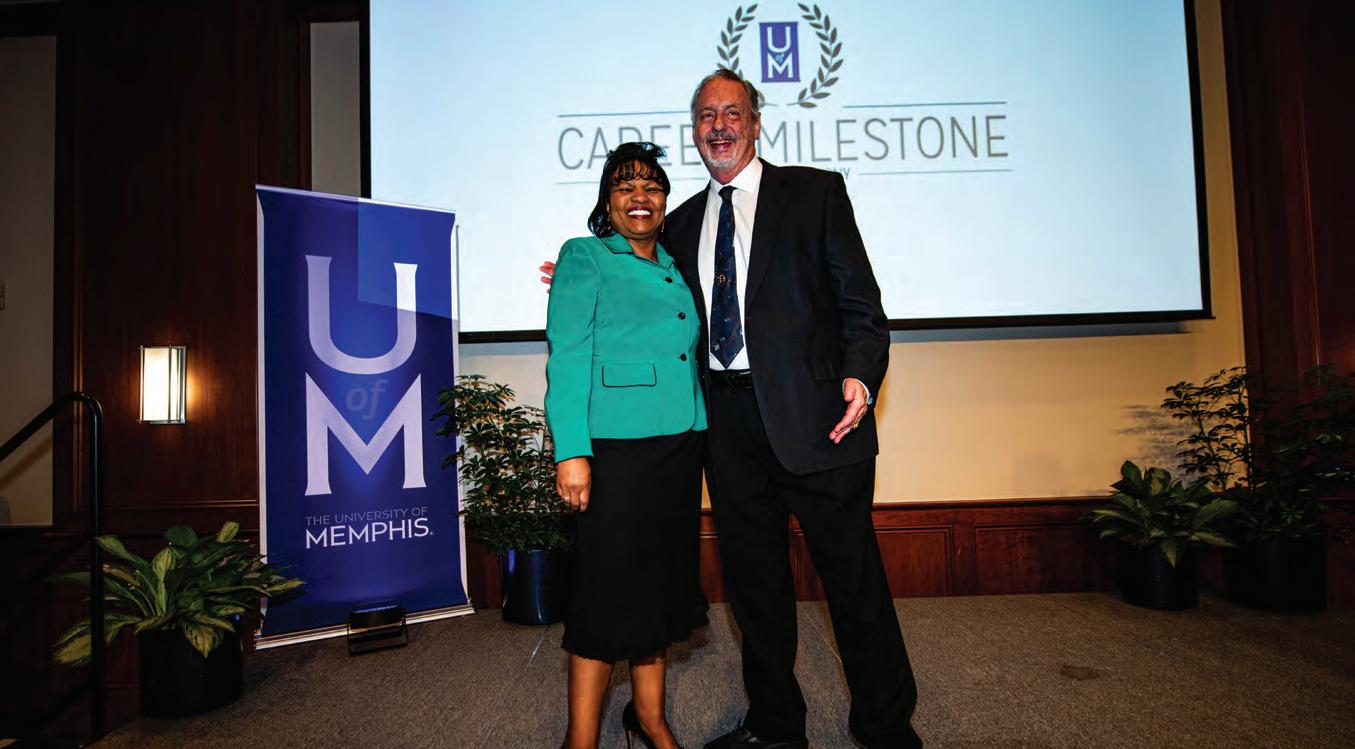
FEB. 7: Career Milestone Crews School of Accountancy professor Peter McMickle (right) is honored by Vice President for Student Academic Success Dr. Karen WeddleWest for 45 years of service to the University at the annual Career Milestone Awards.

FEB. 20: Behind the Scenes
University of Memphis Student Government Association
President Ansley Ecker appears on The College Tour, an award-winning TV series on Amazon Prime that tells the story of universities around the world.

After more than 60 years with Pouncer as the UofM’s costumed mascot, the University introduced Nibbles the Squirrel as Pouncer’s replacement. (April Fools, of course!)
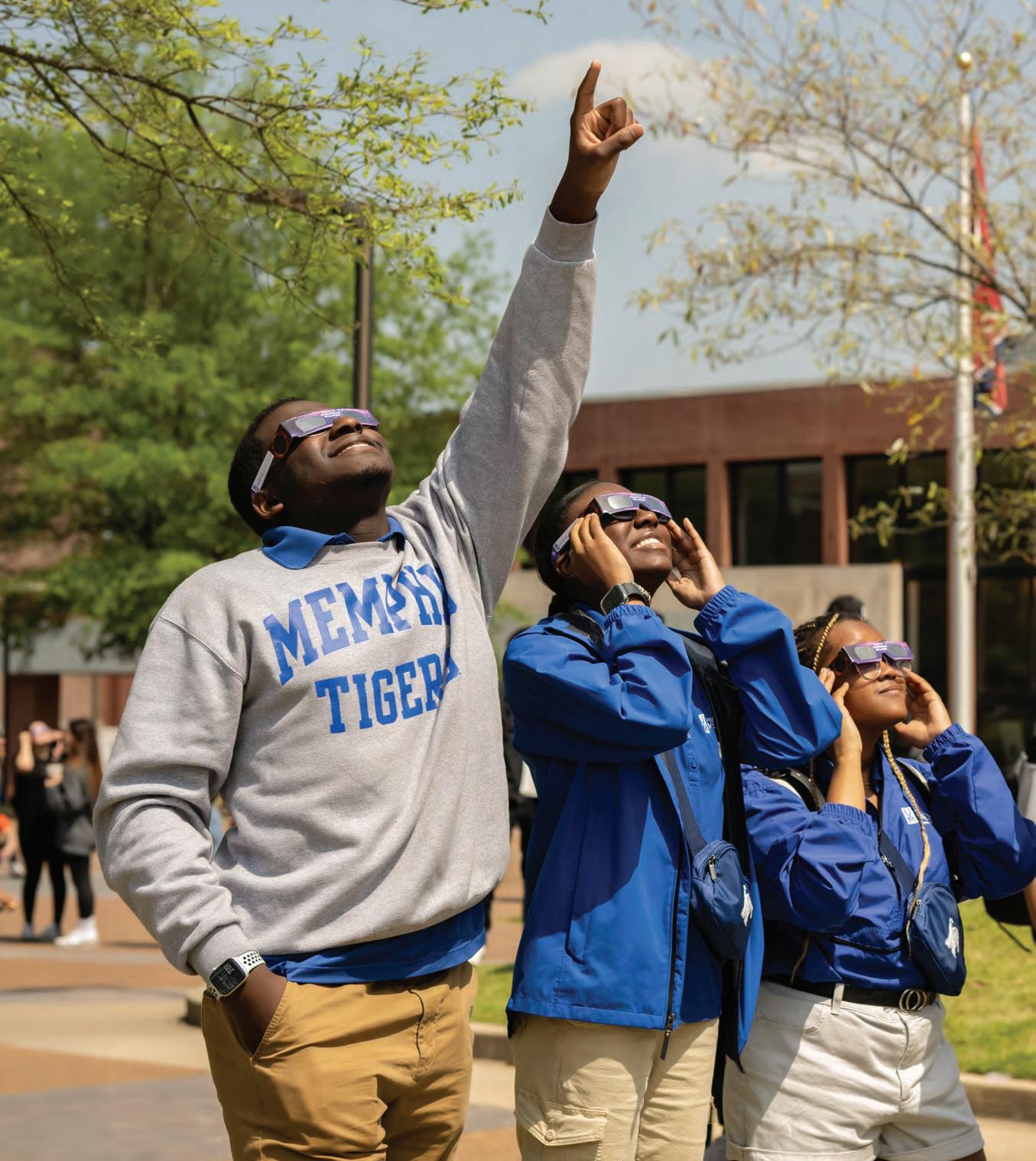
8: Eclipse
UofM students look to the skies during the solar eclipse event hosted by the Department of Physics and Materials Science on the student plaza.
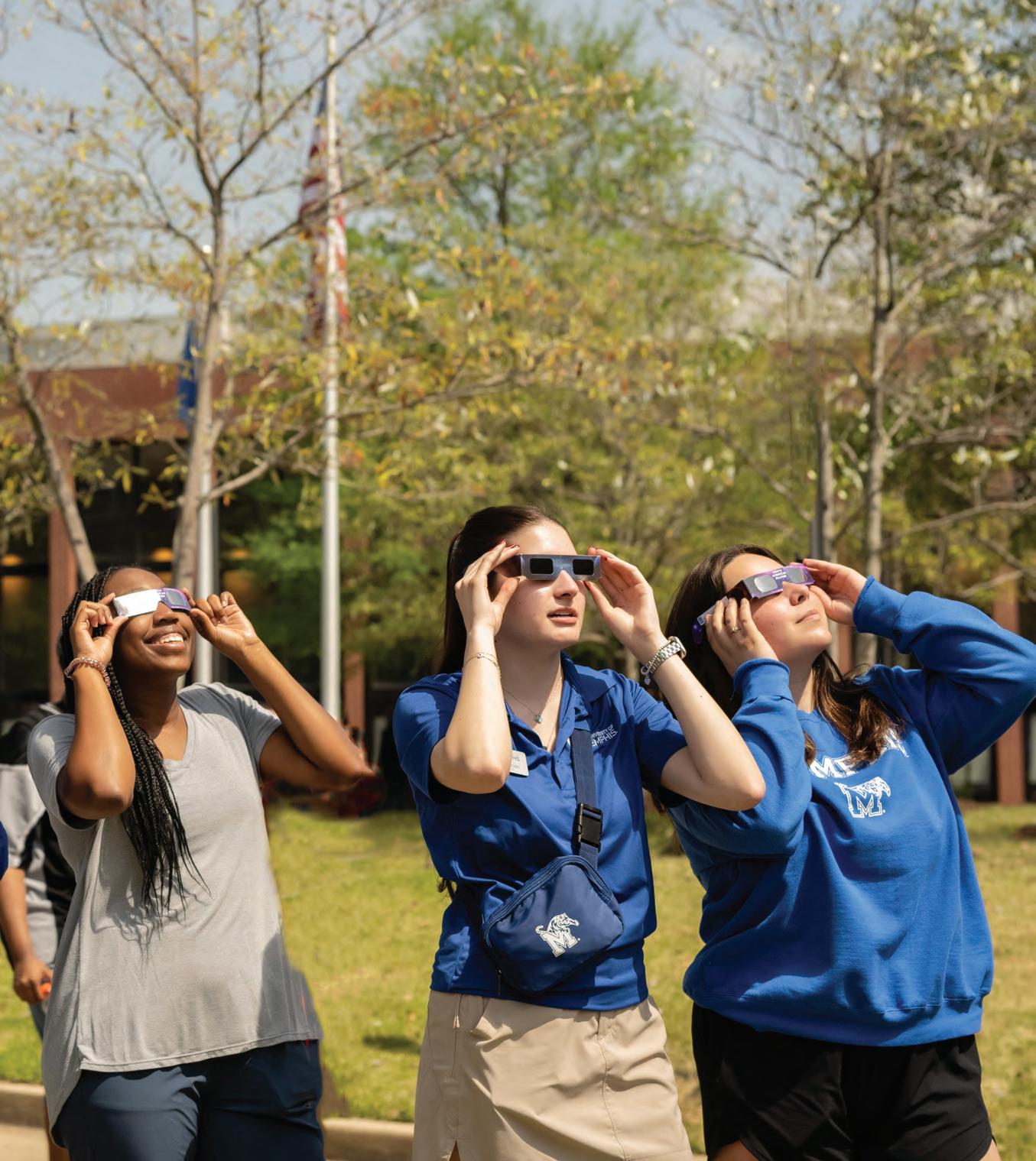
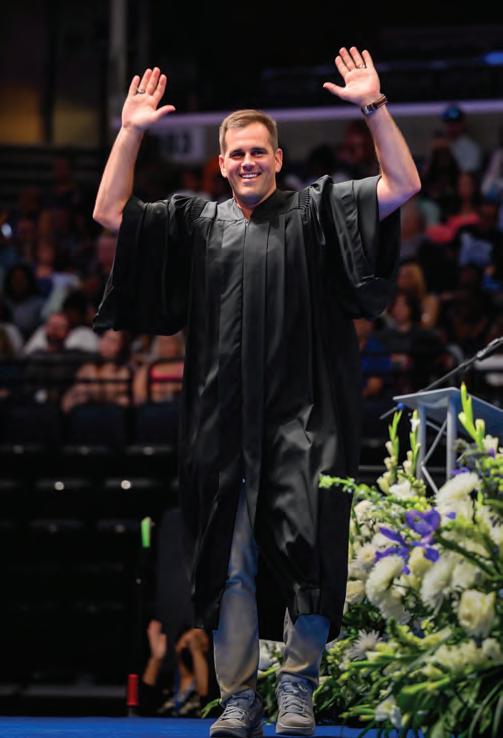
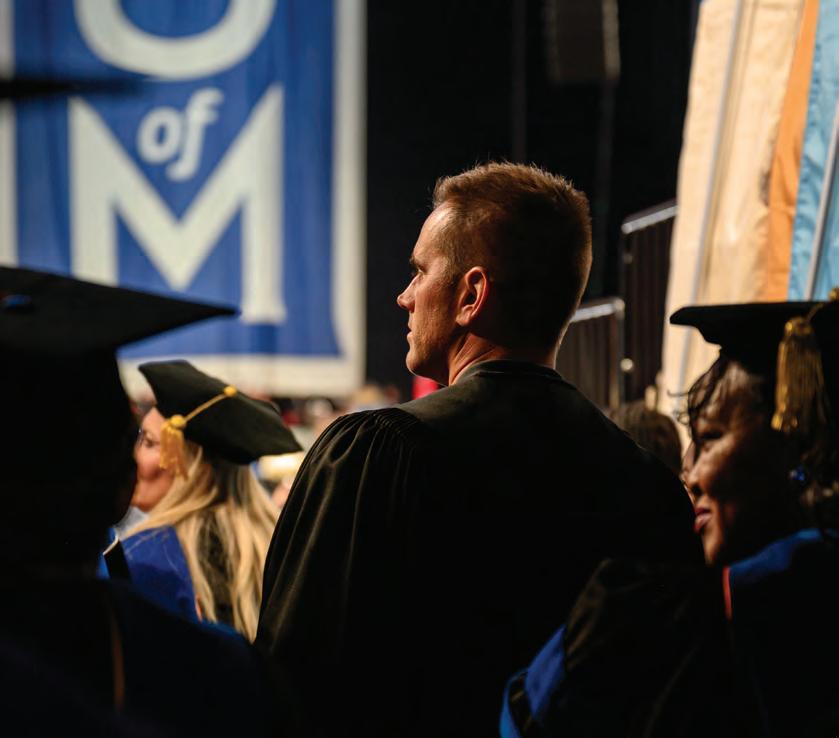
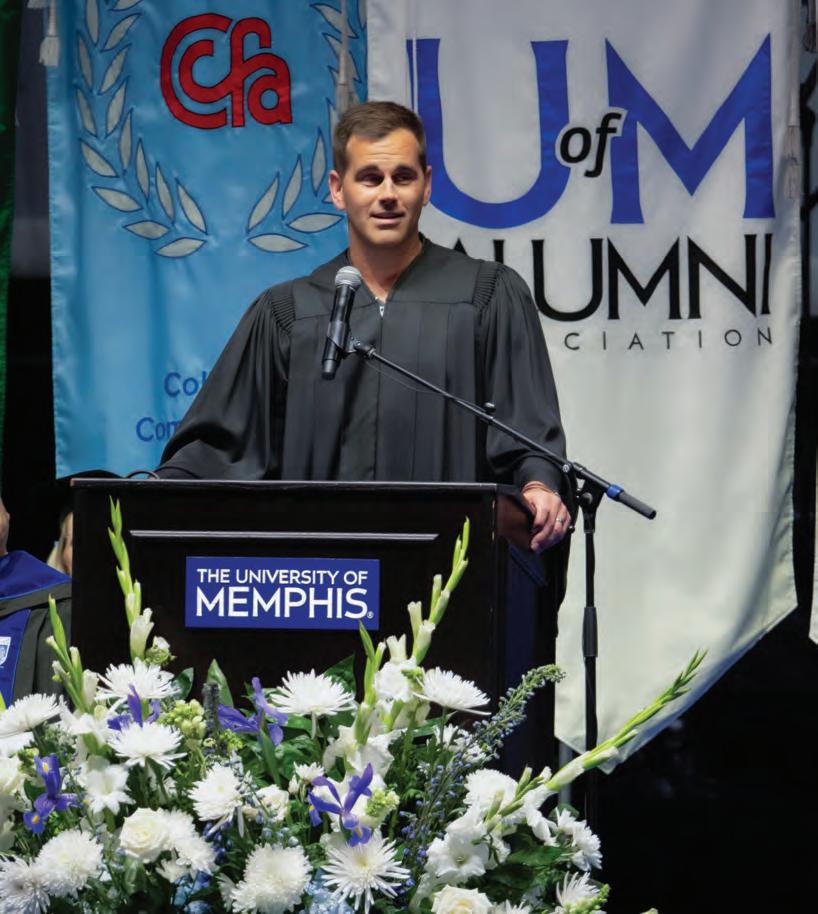
Former Memphis football kicker Stephen Gostkowski served as the spring commencement speaker at FedExForum. Gostkowski, a two-time First-Team All-Pro and threetime Super Bowl champion with the New England Patriots, also walked across the stage for the first time as a UofM graduate. He was unable to attend his own graduation after being selected in the 2006 NFL Draft.
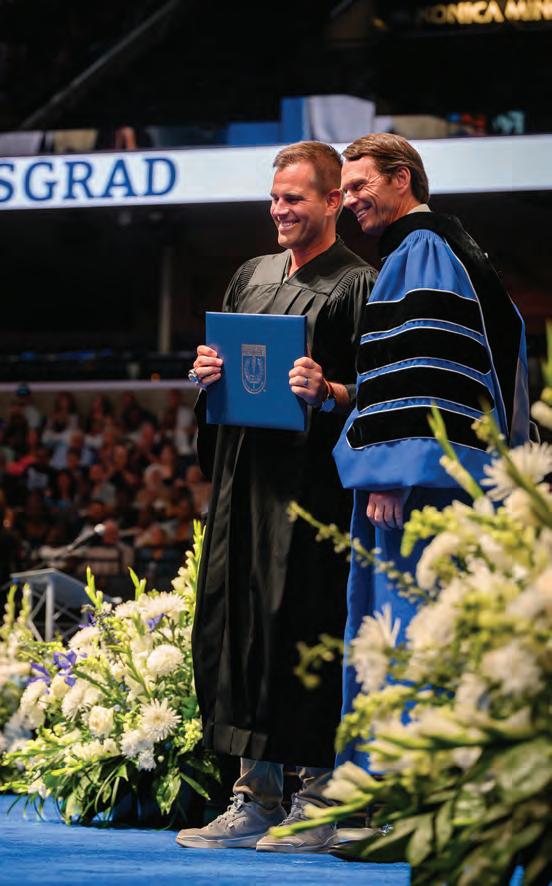

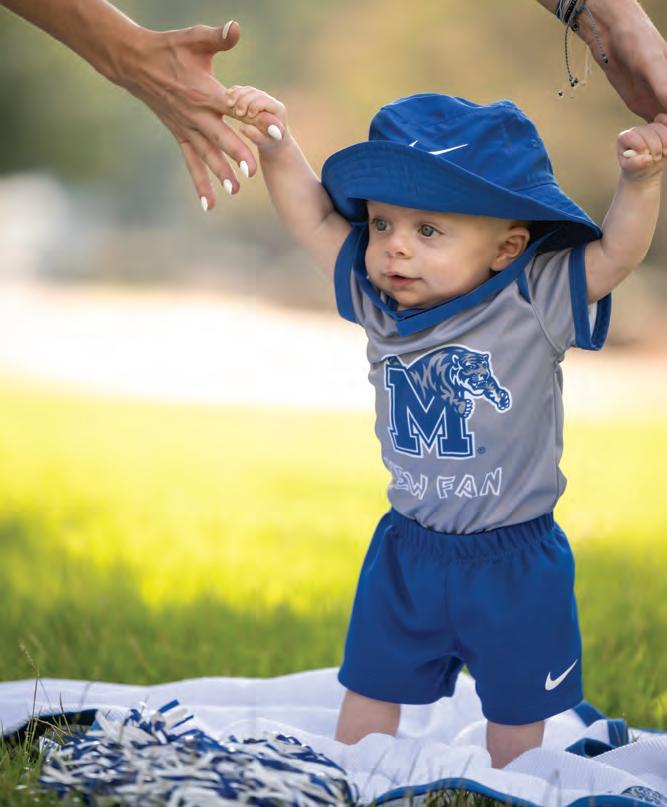
The University of Memphis wants to share your adorable baby Tigers with the UofM community! Submit pictures of your little ones representing the University for consideration to be featured in the next edition of the UofM Magazine.
Submit to: media@memphis.edu


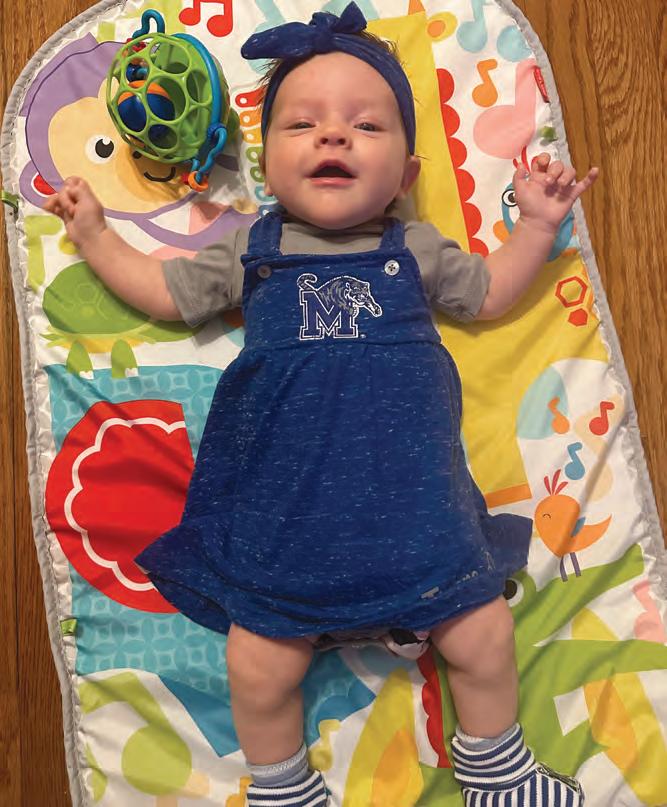
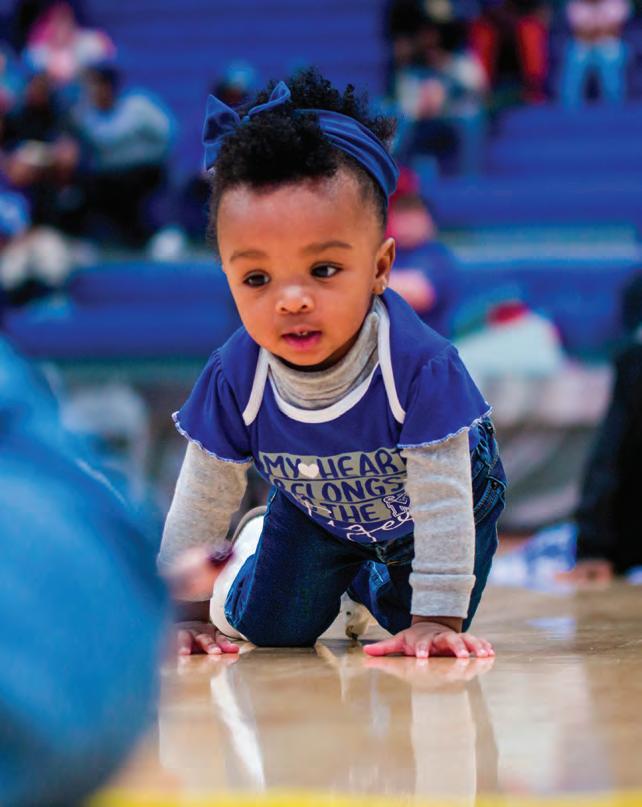

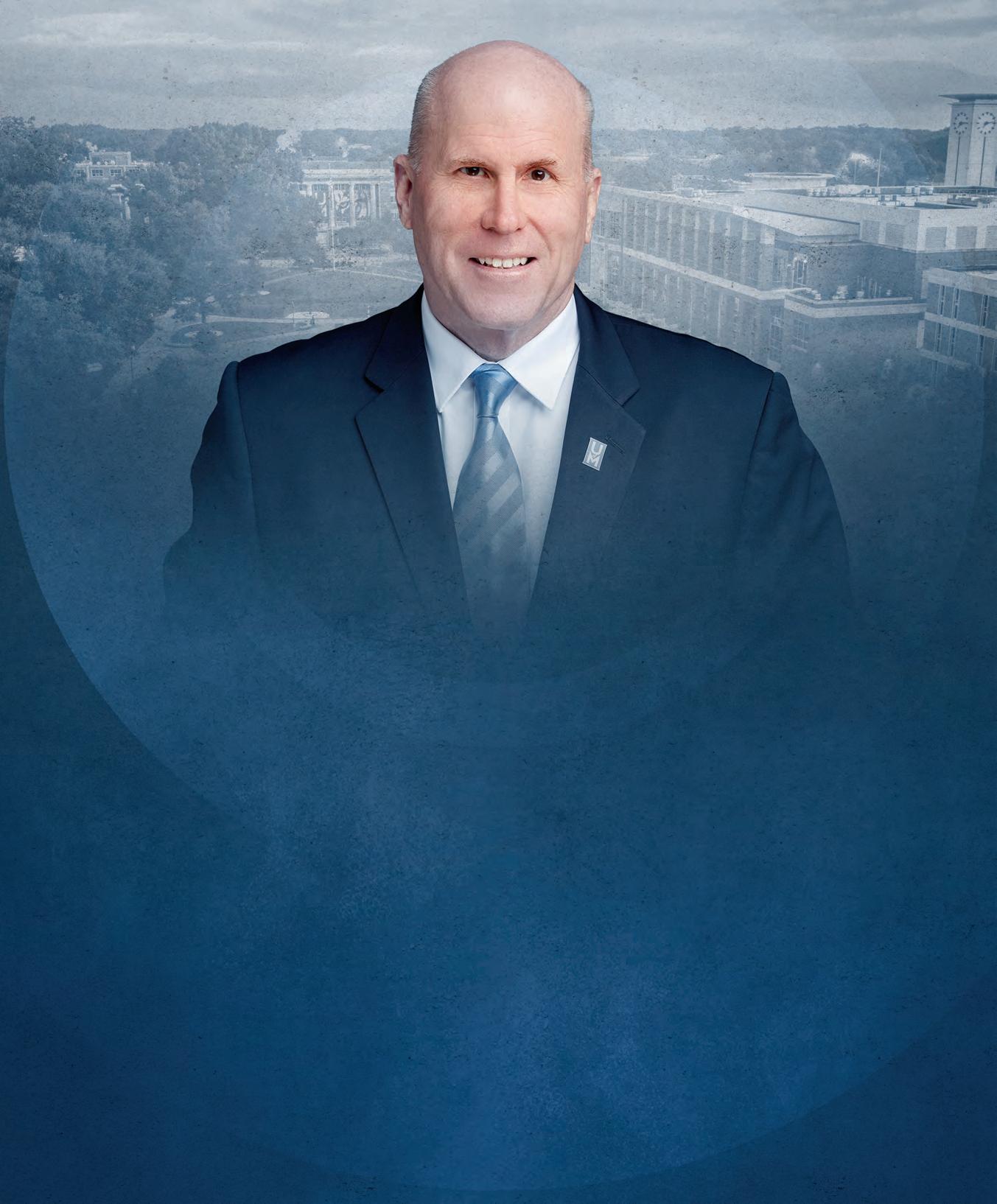
(July 25, 1957-Dec. 7, 2023)
“The University of Memphis is deeply saddened by the passing of Dr. Richard L. Irwin, our Executive Dean for UofM Global, the College of Professional & Liberal Studies and the Center for Regional Economic Enrichment.
Since his arrival at the UofM in 1994, Dr. Irwin stood out as one of the most innovative and impactful leaders at our University. From founding the Sport Management program to overseeing Tennessee’s top-ranked online program to securing the largest grant in UofM history, he continually advanced and improved our institution.
In addition to numerous professional accomplishments, Dr. Irwin was also invaluable to our campus as a mentor, colleague and friend to many faculty, staff, students and community partners.
The UofM is eternally better thanks to Dr. Irwin’s commitment, leadership and service. Our thoughts are with his family.”
— UofM President Bill Hardgrave
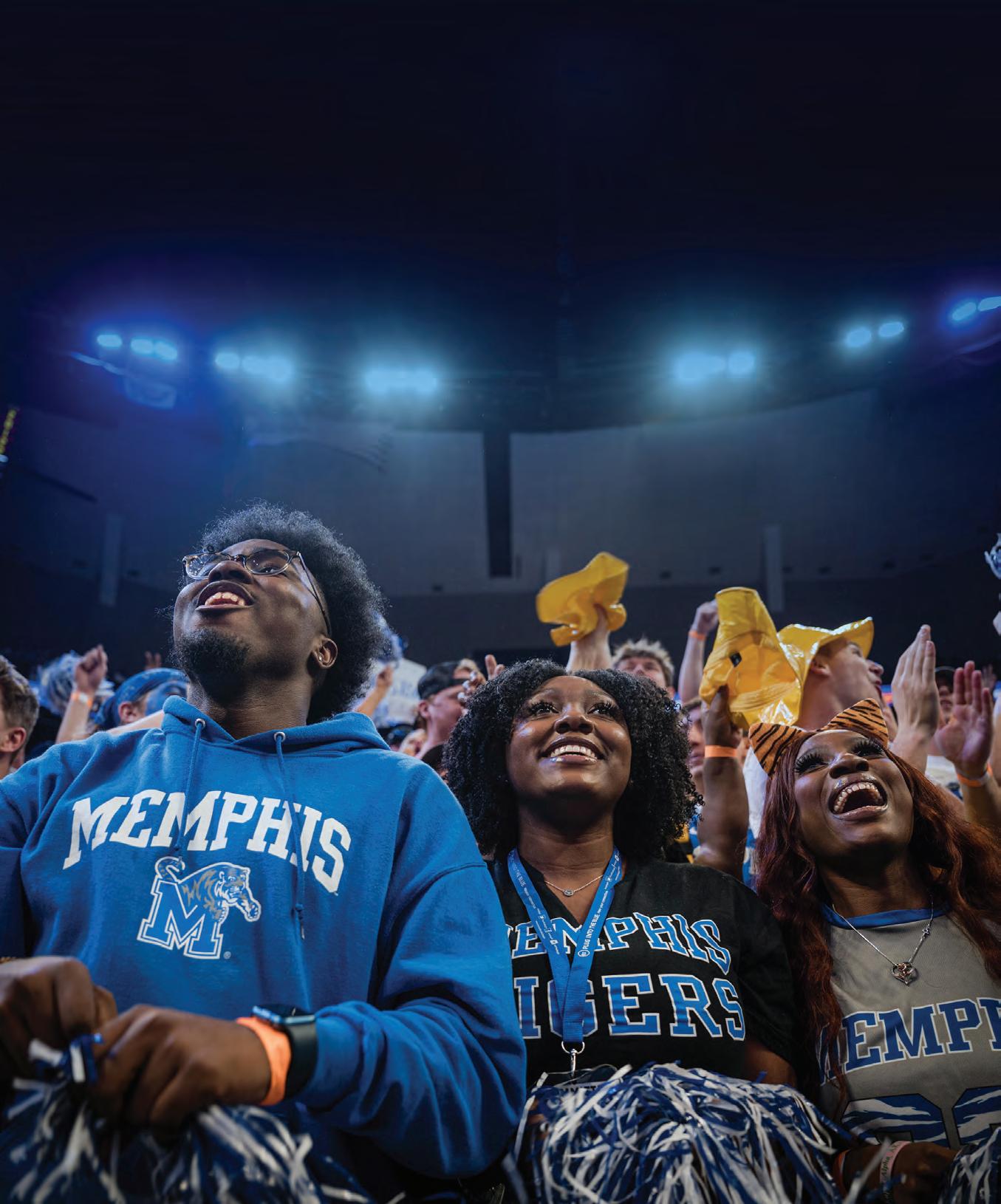
Update your information and empower us to showcase the incredible impact our alumni make across the globe. Our alumni stories not only inspire future generations of Tigers but also reinforce the University of Memphis’s legacy of excellence.
If you are an alum, you belong here.
The UofM Tiger community is ever-growing and ever-changing. To keep pace, our membership model is shifting to include ALL graduates of the University of Memphis at no cost. This transformation not only acknowledges the enduring commitment of our graduates but also paves the way for a more connected and engaged alumni community.
Together, we shape the future, ensuring that the University of Memphis remains a place where success knows no bounds.
